




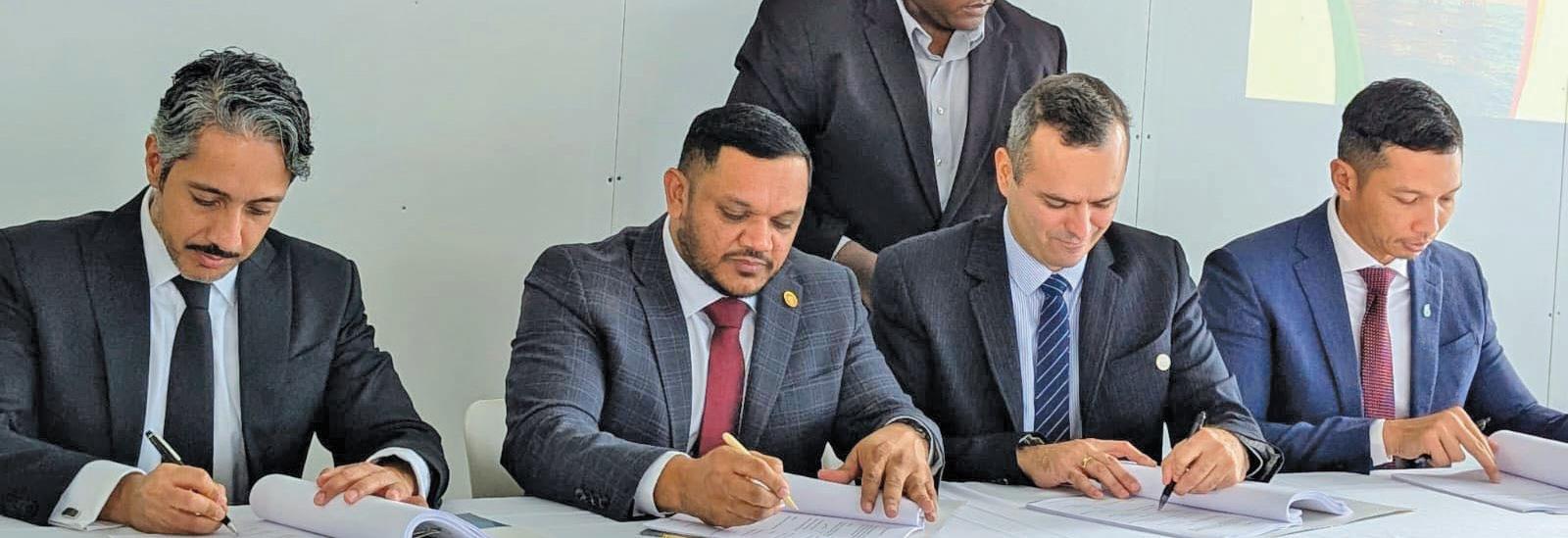
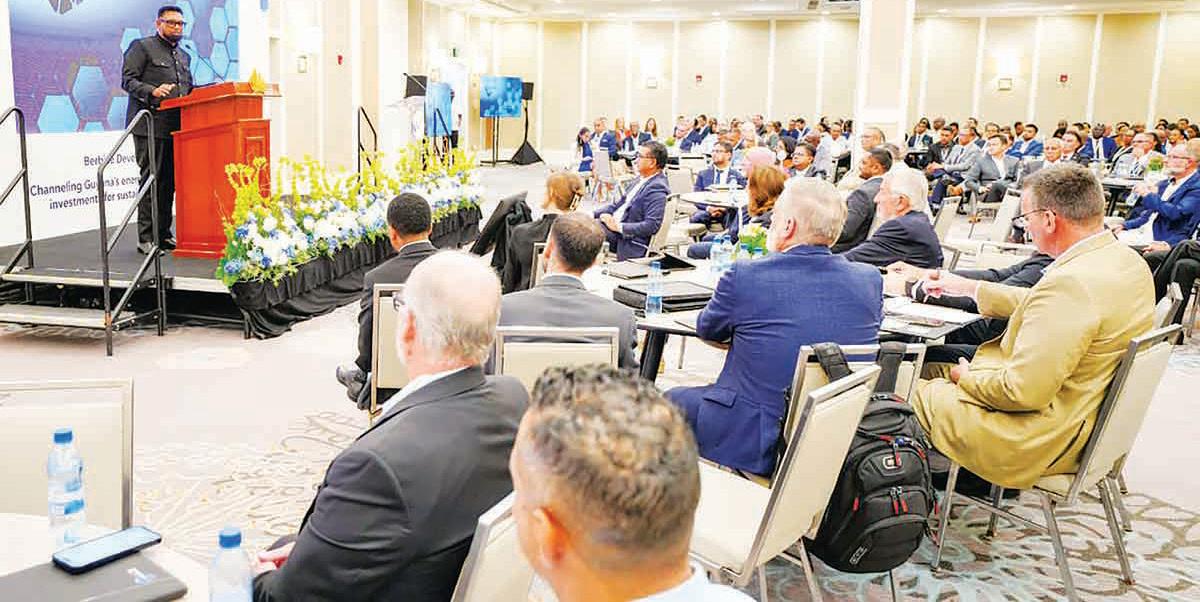






…reminds that US Govt bore legal costs when Guyana sought extradition of persons from US
Attorney General (AG) and Legal Affairs Minister Anil Nandlall, SC, on Monday clarified that the Government of Guyana is legally obligated to finance the prosecution of the ongoing extradition proceedings against United States (US)-sanctioned and indicted businessman Azruddin Mohamed and his
tration’s decision to pay for the attorneys prosecuting the US extradition request follows the same international protocol that would apply if Guyana were seeking to have a fugitive returned from another country. Reminding that in the case of Guyana’s extradition request for murder accused Vishnu Bisram it was the US Government

father, Nazar Mohamed, stressing that such financial responsibility rests with the state from which extradition is being sought. Speaking during a live video interview, Nandlall said it is standard international practice for the requested state to cover the costs of legal representation in extradition matters. Nandlall said the adminis-
that paid for prosecution in that extradition. “In the Vishnu Bisram case, the US Government provided legal services, paid for those services, and then sent him back here,” he recalled. “That is the reciprocal responsibility and arrangement. That’s what reciprocity means, you do for me and I do for you. I don’t know how much I have
to explain these things. The Government of Guyana is paying – that is our duty under extradition law.”
Not political, reciprocity
Nandlall emphasised that the Mohamed family’s claims of political persecution are misplaced and misleading. “In extradition proceedings, the request comes from a foreign state – in this case, the United States Government,” Nandlall explained.
“The lawyers prosecuting this request are representing the interests of the United States Government. In international extradition law and practice, the country to whom the request is made discharges the obligation of providing that legal representation. Obviously, this is done with the approval of the requesting state.”
The AG pointed to previous examples to illustrate the principle of reciprocity that governs such international cooperation. “The Government of Guyana will pay for all the legitimate and legal expenses incurred. That is the duty of the Government. We will do

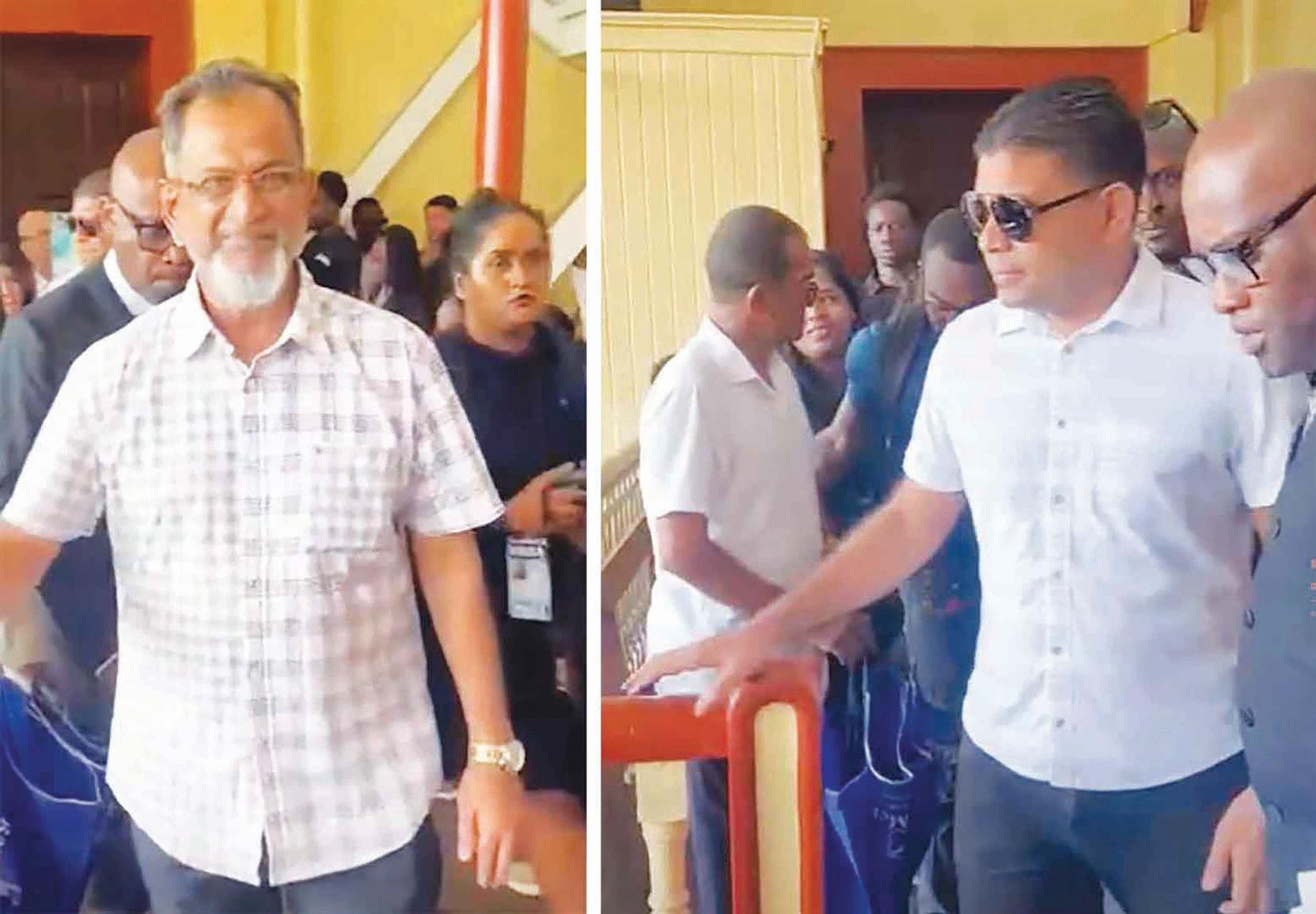
what is required of us,” he affirmed. He stressed that the extradition of the Mohameds is a US-driven process, not a politically motivated local prosecution as claimed by Azruddin Mohamed, who is also a Member of Parliament (MP).
“It is the Americans that are extraditing them, not
Guyana. This is an American extradition request. If there’s any political prosecution, it is the Americans he has to accuse, not the Government of Guyana. We are simply facilitating a process and carrying out our duties under the law and our treaty obligations with the United States. He is making this a spectacle,”
Nandlall noted. “The only person who is bringing politics into this case is Azruddin Mohamed and his family. In fact, I believe that they entered into politics in anticipation of this extradition request coming so that they can have at their disposal this plea of politicisation.”



The Berbice Bridge will be closed to vehicular traffic on: Wednesday, November 12 –22:00h to Thursday, November 13 – 03:00h.


Parika and Supenaam departure times – 05:00h, 10:00h-12:00h, 16:00h, 18:30h daily.




Thundery to light showers are expected during the day, and clear to cloudy skies are expected at night. Temperatures are expected to range between 22 degrees Celsius and 30 degrees Celsius.
Winds: Easterly to East South-Easterly between 2.23 metres and 4.02 metres.
High Tide: 10:07h and 22:31h reaching maximum heights of 2.07 metres and 2.12 metres.
Low Tide: 15:59h reaching a minimum height of 1.20 metres.










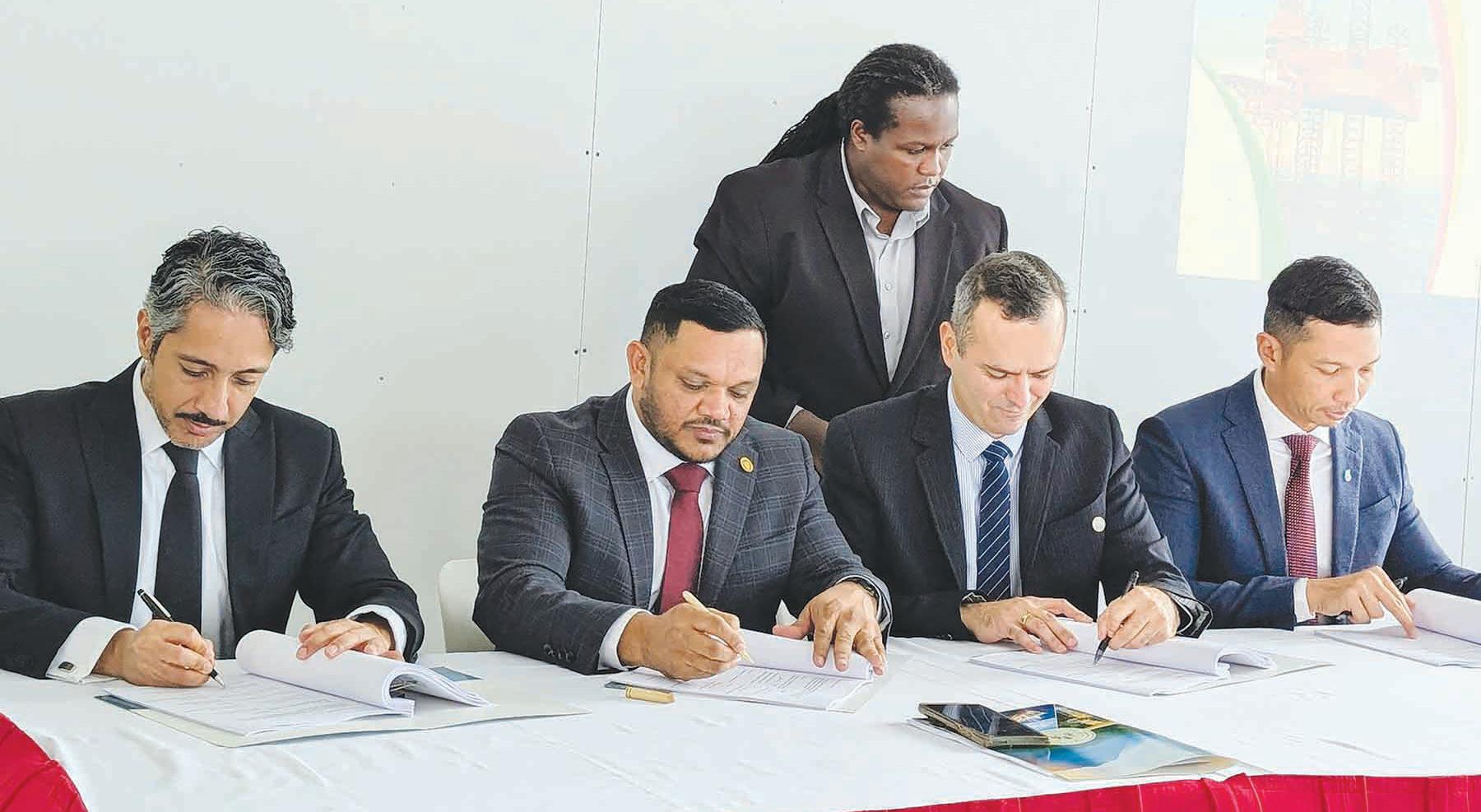
The Government of Guyana, through the Natural Resources Ministry, has officially signed a Production Sharing Agreement (PSA) for shallow-water Block S4 offshore Guyana with a consortium comprising QatarEnergy (35 per cent), TotalEnergies (40 per cent, operator), and PETRONAS (25 per cent). The award was made under the 2022 Guyana Licensing Round, the country’s firstever bid round, marking another major milestone in Guyana’s efforts to responsibly develop its hydrocarbon resources. The PSA for this block carries a signing bonus of US$15 million.
Block S4 spans approximately 1788 square kilometres (km), located 50 to 100km off Guyana’s coast in water depths ranging from 30 to 100 metres. Exploration activities will be conducted in compliance with Guyana’s regulatory standards and international best practices for environmental protection and resource management.
Natural Resources Minister Vickram Bharrat on Tuesday welcomed the signing, noting that the agreement generated significant interest in Qatar, particularly from QatarEnergy, and has since encouraged other Qatari investors to explore opportunities in Guyana’s various sectors.
“It's the first PSA that we are signing after the 2016 Starbrook PSA with improved fiscal terms, improved conditions, well, stronger penalties. But I hear you that you are not here to pay penalties. And I fully agree with you. We are not in the business of collecting penalties either. We want exploration, benefits for Guyanese and lead to production. That is what we want. We want other blocks to start producing as well too, and not only the Starbrook block. So that can add to our production figures by the year 2030 and beyond, and something that we can boast of as a small
say that we are producing 900,000 barrels of oil today, but we still have a forest the size of the United Kingdom. Not many countries can say that we're looking to develop our gas resources, but we will still be carbon negative. Not many countries can do that. So, our model, I believe, is a model that should be used around the world when it comes to balancing economic development with environmental sustainability.”
PSAs before end of 2025
Further, the Ministry is aiming to finalise ongoing negotiations and sign at least two additional Production
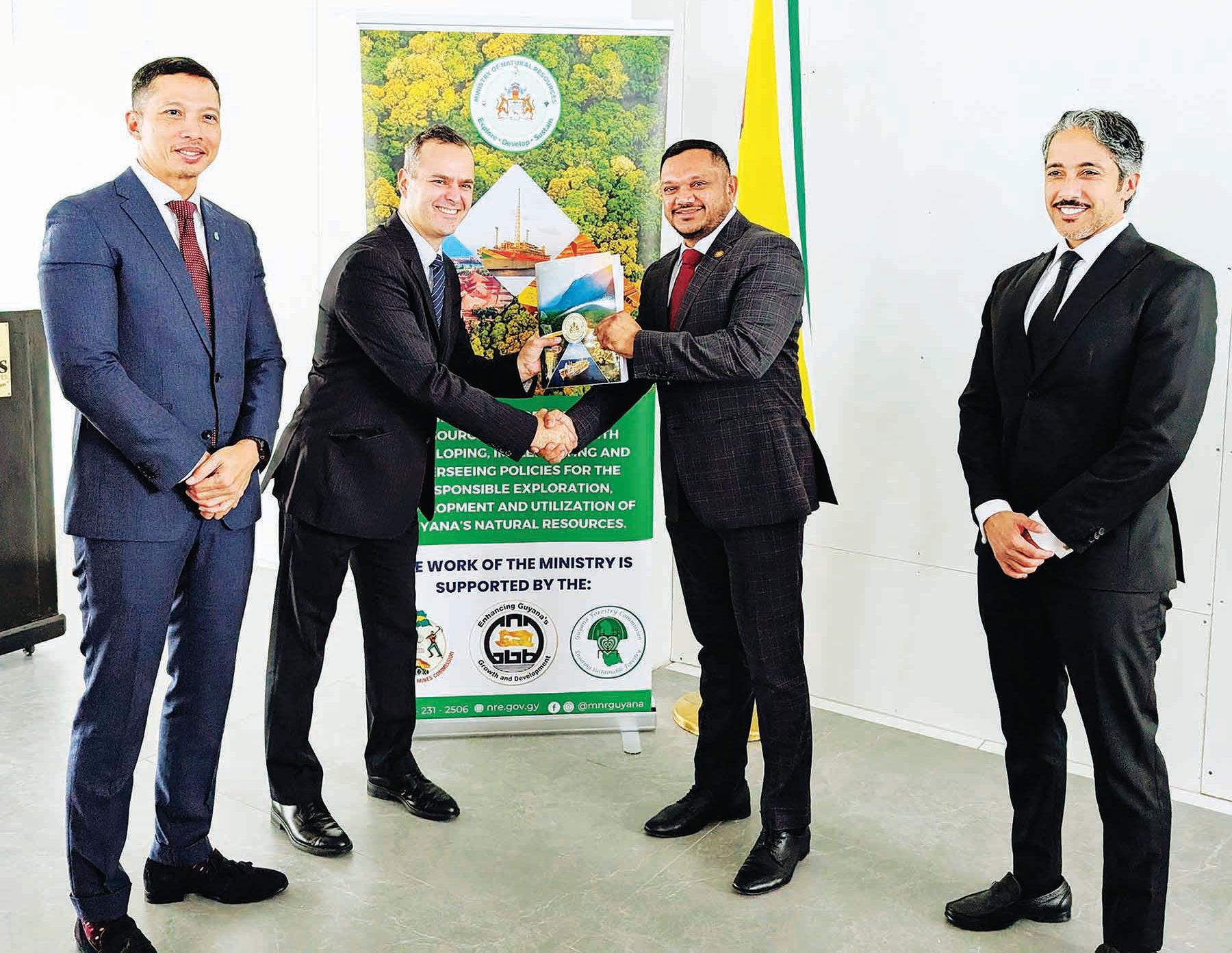
country now developing,” the Minister said.
The Minister reflected on Guyana’s progress in building strong institutional mechanisms early in its oil and gas journey, contrasting it with other nations that took decades to establish sovereign wealth funds. He underscored that the revised Natural Resource Fund Act now includes stricter controls and greater transparency, allowing Guyana to be recognised globally as a model country among new oil producers.
Bharrat pointed to national development achievements funded through oil revenues – such as new bridges, highways, hospitals, schools, free university education, and large-scale housing initiatives – as proof of the sector’s positive impact.
He also addressed the global debate on fossil fuels, emphasising Guyana’s balance between economic development and environmental sustainability.
“Guyana has, really, one of the better-managed oil and gas sectors in the world among new oil-producing countries. And that is something that we're proud
of, and that is something that we can go on the roof and shout about, because there are evidence to demonstrate that. And if we look at the development taking place in Guyana today, it is another testimony of how well the sector is being managed and the resources are being used to enrich the lives of every single Guyanese.”
“Not many countries can
Sharing Agreements (PSAs) before the end of 2025. When asked whether the signing of the Block S4 agreement indicated that the model Production Sharing Contracts (PSCs) for both shallow and deep-water blocks had been finalised and standardised, Minister Bharrat confirmed that this was indeed the case.



Editor: Tusika Martin
News Hotline: 231-8063 Editorial: 231-0544, 223-7230, 223-7231, 225-7761
Marketing: 231-8064 Accounts: 225-6707
Mailing address: Queens Atlantic Industrial Estate Industrial Site, Ruimveldt, Georgetown
Email: news@guyanatimesgy.com, marketing@guyanatimesgy.com
The Stabroek Market Square in Georgetown, long recognised as both a commercial hub and a cultural landmark, has historically reflected vibrancy. Yet, like many urban public spaces in Guyana, it has faced challenges in maintaining cleanliness and order, which affect not only the aesthetic appeal of the area but also the health and safety of vendors and visitors. In this context, the Local Government and Regional Development Ministry’s launch of the “Going Forward” initiative is a significant and welcome step in the evolution of civic responsibility and urban management.
Introduced on Monday evening, the initiative seeks to combine practical infrastructure with community engagement to cultivate a cleaner, more organised Stabroek Market Square. Central to the project is the strategic placement of garbage bins at 40-foot intervals across the market and adjacent streets, spanning Brickdam Street to the Head of Avenue of the Republic, along Lombard and Water Streets, and encompassing the perimeter of the Human Services and Social Security Ministry. By providing accessible and consistent points for waste disposal, the Ministry has removed one of the primary barriers to maintaining cleanliness, the lack of convenient receptacles.
Equally critical to the initiative is the approach to waste collection, as garbage will be collected twice daily, timed to coincide with peak market activity. This alignment ensures that refuse does not accumulate during the busiest hours, reducing unsightly litter and minimising health hazards. Such operational planning demonstrates a level of foresight and responsiveness often absent in previous urban maintenance strategies, highlighting the Ministry’s commitment to a sustainable solution rather than a short-term fix.
Perhaps the most notable aspect of the “Going Forward” initiative is the Ministry’s emphasis on partnership over punishment. Minister Priya Manickchand articulated that enforcement will not be the immediate focus; instead, the Government intends to engage vendors, market users, and passers-by in a collaborative effort to shift behavioural patterns. This strategy acknowledges a critical truth: infrastructure alone cannot change habits. Civic pride and responsibility flourish when communities are consulted, empowered, and treated as stakeholders in public space management. By fostering dialogue and inclusion, the Ministry signals a willingness to build trust and nurture a culture of cooperation, an approach that is likely to yield far more lasting results than punitive measures alone.
The initiative also emphasises the economic dimension of urban cleanliness. A well-maintained market does not merely enhance visual appeal; it creates conditions that allow vendors’ businesses to flourish. Minister Manickchand highlighted the Government’s commitment to supporting vendors’ livelihoods, emphasising that clean surroundings facilitate better sales, attract more customers, and ultimately contribute to personal and communal prosperity.
The public response to the initiative reflects cautious optimism and a recognition of shared responsibility. Vendors have expressed appreciation for being consulted and included in shaping the project, while officials such as Deputy Permanent Secretary Dr Josh Kanhai have underscored the importance of active participation by every market user, from parents guiding children to proper waste disposal to pedestrians and vendors ensuring that the space remains orderly. The emphasis on practical, everyday actions reinforces the understanding that cleanliness is not solely the Government’s responsibility; it is a collective endeavour.
Stabroek Market’s historical and cultural significance cannot be overstated. As a living symbol of Georgetown’s identity, it embodies the city’s history, diversity, and resilience. Protecting its environment and functionality is, therefore, a matter of national interest. The “Going Forward” initiative demonstrates a pragmatic approach, one that balances infrastructure development with human engagement, operational planning with behavioural incentives, and enforcement with encouragement.
What remains crucial is the sustained commitment of all stakeholders, including vendors and the public, to uphold and build upon this foundation. Success will depend on collective action, habitual responsibility, and a shared understanding that maintaining public spaces benefits every citizen.

By Martin Gelin
Shortly after the first TV debate in the campaign for next year’s Swedish election, there was a startling announcement. Anna-Karin Hatt, the leader of the Centre Party, the standard-bearer for liberal centrism in Swedish politics, announced her resignation, citing an unbearable number of threats and harassment.
Hatt was an emerging voice in Swedish politics but had been able to lead the Centre Party for only five months before she made a speech announcing that she felt forced to leave her job for the safety of her family. Her speech was short on specifics, but she referred to clear physical threats: “Not just from trolls behind a screen; it has come much closer than that.” She said she felt obliged to look over her shoulder in public spaces and no longer felt safe in her own home.
Hatt’s announcement came just three years after her popular predecessor, Annie Lööf, left the party leadership for the same reason: extremist hate, neo-Nazi threats, online trolls and offline stalkers. Lööf was about to deliver a speech at a political festival in Gotland in 2022 when another speaker at the event, a politically active psychiatrist, was stabbed to death. The man convicted of her murder had planned to kill Lööf.
In interviews at the time of her resignation, Lööf said that she felt huge relief at having got out of politics without being physically harmed. The way she talked about her experience of public life sounded less like politics in a healthy democracy than a panicked swim among sharks.
Now, with yet another liberal woman prematurely departing Swedish politics, we need to be clear about what is happening here: women are being chased out of public life by unconstrained hate groups, online trolls and far-right extremism. In one of the world’s strongest democracies, this is becoming the new normal.
Hatt’s experience follows a
global pattern, where vile men try to assert their power over women in public life by threatening to physically hurt or kill them. A loud minority of extremists are mobilised by an increasingly toxic and unregulated social media environment and the rise of authoritarian far-right parties.
Despite the alarming nature of these threats, establishment conservatives in the Swedish government have mostly dismissed the concerns. Sweden’s prime minister, Ulf Kristersson, nonchalantly said that Hatt should have been more “thickskinned”. Most right-wing pundits echoed him, implying that Hatt was simply not up to the task and that the onus was on her to toughen up.
If their logic is that death threats and stalkers have to be priced in if you want to participate in public life, then we are likely to see fewer people doing so. And those Swedes who are most likely to be the targets of attack – women, immigrants and minorities – are the ones most likely to avoid seeking public office. This would be a crushing retreat for democracy in one of the world’s most open societies.
After Hatt’s resignation, Lööf wrote a vivid description of the kind of threats that had forced her to leave her job in 2022. “Death threats, empty bullet casings in my mailbox, Nazis outside my home, hate campaigns on social media, threats against my family. I have sat face to face with a man who planned to kill me – because of my values. A man who has been convicted of murder and terrorist crimes for preparing to commit murder. A man who began tracking me as early as 2013. These are the terrible downsides of public office.”
Her refusal to form a government with a far-right party was the reason for the vile attacks, she claimed.
Amandah Andersson, policy chief at the Centre Party’s women’s organisation, Centerkvinnorna, tells me that Hatt “inherited” a part of the [online] environment that was
directed at Lööf. “As a woman, there is a bigger risk of exposure to harsh threats and hatred,” she says.
Much of the contempt for Hatt and the Centre Party comes from far-right nationalists, who are upset about these politicians’ relatively liberal views on immigration. But it also comes from traditional conservatives, who are frustrated that the Centre party no longer wants to govern with the ruling Moderate party, which now relies on an alliance with the farright Sweden Democrats for a governing majority.
Last year, an investigation by Swedish TV4 revealed that the Sweden Democrats were operating a vast network of troll farms to systematically harass and abuse political opponents and spread false information.
The Sweden Democrats’ own TV network, Riks, has consistently demonised the Centre Party, and particularly Lööf. She was called “Sharia Annie” with “sociopath eyes” for staying true to her defence of immigration. Riks has more than a million regular viewers in Sweden.
Despite its reputation for safety and stability, Sweden has a recent history of brutal political violence. Prime Minister Olof Palme was murdered in 1986. In 2003, the foreign minister Anna Lindh, also a Social Democrat, was murdered in a department store in central Stockholm. In 2011, 77 young left-wing activists were murdered in a far-right massacre in Utøya, in neighbouring Norway, but several of the victims and survivors were Swedish. The attack left a huge scar on all Scandinavian politics, with immeasurably chilling effects for new generations of activists.
Targeting women in politics with abuse is a global issue. Already in 2016, a report which looked at data in 39 countries showed that psychological violence affected four in every five female parliamentarians. Sexually demeaning remarks affected 65 per cent of those surveyed, “followed by threats of death, rape, beatings or abduction (44 per cent)”, according to
the report.
Sanna Marin, who became prime minister of Finland in 2019, was the target of more online abuse than any other Finnish politician. According to a NATO StratCom report, female ministers in Finland receive about 10 times the number of abusive messages on social media compared to their male counterparts.
During the two decades in which I covered US politics, I saw how quickly online abuse can transform into physical violence. From the attempted murder of the Democratic congresswoman Gabrielle Giffords in Arizona to a far-right terrorist plot against Michigan governor Gretchen Whitmer, from the attacks on the home of Nancy Pelosi to the recent murder of Minnesota Democrat Melissa Hortman.
Similar patterns are emerging in European politics. In 2024, a report from the Council of European Municipalities and Regions (CEMR) showed that seven in 10 women in European politics had suffered abuse and harassment. In many countries, including Germany and Ireland, numbers were even higher. We should also consider how this is connected to the global far-right’s escalating attacks on DEI and diversity programmes, which are often less about affirmative action than questioning the mere presence of women and people of colour as public officials in any public spaces.
Of course it is possible to allay fears about extremism in Swedish politics by citing the country’s ranking as a stable democracy, its high levels of democratic participation and its commitment to gender equality.
But this is precisely why it’s so concerning that another prominent Swedish woman has been forced out. Even in one of the most stable democracies in the world, the threat of extremist violence is transforming political representation. (The Guardian)
(Martin Gelin is a journalist and author. He writes for the Swedish newspaper Dagens Nyheter)
You can send your letters with pictures to: Guyana Times, Queens Atlantic Investment Estate, Industrial Site, Ruimveldt, Georgetown, Guyana or letters@guyanatimesgy.com
Dear Editor, Since becoming President in August 2020, His Excellency Dr Ali has received very strong, solid and enthusiastic support from Prime Minister Brigadier (ret’d) Mark Phillips, Vice President Dr Bharrat Jagdeo and the cabinet, especially from the Minister of Housing and Water, Mr Colin Croal. Minister Croal has posited that President Ali’s administration would reach its target of providing affordable house lots to most if not all Guyanese. The housing minister has reaffirmed the government’s commitment to transforming land allocations into tangible homeownerships for the residents during President Dr Ali’s second term. According to Mr Croal, during the next five years, the government will embark on a wider dis-
tribution programme, from simply allocating house lots to ensuring that affordable houses are available to every Guyanese family. Over the last five years, Minister Croal has done an excellent job in distributing more than 50,000 house lots and hundreds of reasonably priced houses to Guyanese and will continue to do so in the future.
Regarding governance, President Ali, PM Phillips and VP Jagdeo continue to progressively provide substantial incentives to stimulate the economy, create jobs, lower the cost of living, expand the agriculture and mining sectors, and improve education, health care and the living standards of every Guyanese. Their goal is to make sure that no one is left behind and that everyone, regardless of race, ethnicity, creed or party af-
filiation, is included in the development process of the country. His Excellency Dr Irfaan Ali’s “One Guyana Initiative” epitomises unity and his bold, forward-looking, and prudent vision for innovation and collaboration to advance Guyana’s development for the next five years and beyond. Together, they are the embodiment of Guyana’s rapid and incessant development, treasured culture and prized heritage.
President Ali’s gallant leadership and excellent communication skills were evident at the 30th annual meeting of the Conference of the Parties (COP 30) to the United Nations Framework Convention on Climate Change (UNFCCC), held in Belém, Brazil, where he once again placed Guyana at the forefront of the global system and world issues.
This is a major international conference where the leaders of countries negotiate and agree on actions to stabilise greenhouse gas emissions with the aim of combatting global warming. COP30 originated from the Agreement in Paris, which is a legally binding treaty on climate change that was adopted by 195 countries at the UN Climate Change Conference in Paris, France, on December 12, 2015. Its overarching goal is to limit or reduce the temperature to 1.5 degrees Celsius above pre-industrial levels.
During a round table discussion, the Guyana Head of State urged the leaders at the COP30 Summit to chart a new course to confront the global climate crisis and accelerate sustainable development. He called on them to move from promises to actual progress and
Dear Editor,
Reference your frontpage news item (Nov 11) on the President’s directive to digitize NIS documents.
President Ali is held in great esteem and reverence for several Government projects. Modernizing the public service is another that is welcomed by both sides of the political divide. All Government records should be computerized (digitized) for easy access for business and services. The public will be the beneficiary with efficient services as documents will be easily accessed for verification.
President Ali is supported in this directive to
Finance Minister Ashni Singh to have the records of the National Insurance Scheme (NIS) digitized within the next eight months. It is also in Government’s interest that all Government documents (past and present) be digitized; all historical (colonial) records (slavery and indentureship) should also be computerized. Also cheered is the launching of “Upskilling Platform”, providing training (in digitisation and other skills) for the public service to further Government efficiency when the public access various public services. Training for staff are critically important steps
in digital transformation. Staff must be tech savvy. Digitizing records (NIS and others) provide searchable access to records of the public. It leads to increased efficiency and productivity by allowing for quick access to computerized documents. Reducing paperwork will save Government a lot of money. Paper records are growing and require extensive physical storage space which are expensive and difficult to maintain as well as manual labour. Digitisation eliminates the need for storage of large volumes of paper work. Paper wastage is eliminated, a gain for the environment. And one does
not need to go through large amounts of paper files to verify documents; it eliminates the need for storage space or physical labour to move files. Information can be accessed from anywhere. A few keys on a computer provide all the necessary information to verify information and provide services to the public. Money is saved as overall administrative costs of Government services are reduced resulting in less manpower and associated costs.
The country is a winner in digitisation.
Yours sincerely, Vishnu Bisram
Omission of facts creates a misleading impression of non-compliance
Dear Editor, The Ministry of Agriculture (MOA) notes the recent media reports referencing the Auditor General’s 2024 Report on the Public Accounts of Guyana, which highlighted the issue of outstanding sums owed by the contractor, Tepui Group Inc, in relation to the Belle Vue Pump Station project.
While the coverage accurately referenced the Auditor General’s remarks on the recovery of advanced payments, it failed to reflect the full context of the report – particularly the Ministry’s detailed response and the Audit Office’s own recommendations regarding the matter.
As stated in the Auditor General’s report, the Head of the Budget Agency confirmed that the National Procurement and Tender
Administration Board (NPTAB) approved an assignment of contract between the two contracting firms on June 13 2025 for the continuation of the works. The Ministry also indicated that the Advance and Performance Bonds remain in place and subject to verification and updating.
Noteworthily, the reported outstanding sum of $121.717M, or 93 per cent of the mobilisation advance payment, relates to an advance payment bond that expired on March 21, 2025. To remedy this, the MOA engaged GAICO as a subcontractor on June 13, 2025.
The MOA wishes to affirm that all these recommendations are actively being implemented. Continuous monitoring, verification, and contractual compliance reviews are underway in strict ac-
cordance with the Auditor General’s guidance.
Therefore, the selective reporting that omits these facts creates a misleading impression of non-compliance. On the contrary, the relevant ministry and oversight bodies remain fully aligned with the audit’s recommendations.
The Government reiterates its commitment to
transparency, accountability, and compliance in all public procurement activities and urges responsible reporting that reflects the complete findings of official reports rather than partial extracts that may misrepresent the facts.
The Ministry of Agriculture

speed up the global energy transition from fossil fuels to clean energy while ensuring energy security for the more than eight billion people in the world. However, he cautioned the leaders at the Climate Change summit that while the transition from carbon fuels to other forms of energy required massive financing, the plan to hastily end the use of fossil fuels is unfair to the Global South countries. Without it, many developing countries, including Guyana, which is now a major producer of fossil fuels, will simply have no choice but to depend on it to advance their development and improve the living standards of the people.
However, His Excellency urged the leaders at the Summit to adopt a fair and balanced rules-based and equitable approach to the transition from fossil fuels to other systems of energy.
President Ali emphasised that while there is a clear global consensus on the need to transition from fossil fuels to other forms of energy, the path forward must recognise the economic impact on the developing nations, most of which are burdened by high debt, acute poverty, limited access to affordable finance and a deficiency in modern-day technology.
Several leaders at the Summit heaped praise on President Ali for Guyana’s Low Carbon Development Strategy (LCDS), which integrates solar, hydropower and gas-to-energy projects aimed at lowering carbon emissions, reducing energy costs, protecting the
planet and reaching the United Nations 2030 deadline for achieving the 17 Sustainable Development Goals (SDGs). This agenda is a universal blueprint for a better future for this and future generations and the planet, with the objective of ending poverty everywhere.
In the end, President Ali made it clear that the Global South (underdeveloped and developing countries), which produces less than one-third of carbon emissions, is facing the most severe impacts of climate change. He emphasised that massive financial investments are needed to protect lives, lower poverty, improve food security, strengthen economies and maintain global peace and stability. Given the rapid increase in population worldwide, President Ali was blunt when he questioned whether the world was quiet and absolutely prepared to meet the growing energy demands of the 21st century without the use of fossil fuels. Efforts and solutions to combat the climate change crisis are a very complex and problematic issue; therefore, every Guyanese should admire, applaud and praise President Ali for his candid, forthright and pragmatic discussion at the COP30 Summit held in Belem, Brazil. Not only did he raise the stakes on the issue of climate change, but he also stressed the need for urgent action to solve this devastating crisis before it is too late.
Yours sincerely, Dr Asquith Rose

00:00 Sign Off 06:00 Cartoons 07:00 Evening News (RB) 08:00 Anthony Bourdain Parts Unknown 09:00 Stop Suffering 10:00 Movie - Freakier Friday (2025) 12:00 News Break
12:05 Indian Movie - Jab Tak Hai Jaan (2012)
15:00 Movie - Love on the Sidelines (2015) 16:30 Indian Soaps
17:00 The Young & The Restless 18:00

The perimeter (P) is the total distance around a shape. Think of it as the length of the boundary or fence around a figure.
The method to find the perimeter of a shape is to add all the sides. In the case of a circle, the perimeter is stated as the circumference of the circle.

The table below shows the formulae to find the perimeter for two-dimensional shapes:


Example 1
What is the perimeter of an equilateral triangle whose side length is 7cm?
Perimeter of triangle = a + b + c
P = 7+7+7 = 21cm
Materials:
• Empty plastic water bottle with cap
• Isopropyl rubbing alcohol
• Safety goggles
Instructions:
• Remove the label from the plastic water bottle.
• Put on your safety goggles.
• Pour a small amount of alcohol into the bottle.
• Put the cap on the bottle.
• Slowly rotate the bottle so the alcohol coats the inside of the bottle.
Example 2
If the lengths of parallel sides of a parallelogram are 8 cm and 11 cm, then find its perimeter.
Perimeter of Parallelogram = 2 (a + b)
P = 2 (8 + 11)
P = 2 x 19
P = 38 cm
Example 3

If the radius of a circle is 21 cm, then find its perimeter given ? = 3.14
Perimeter of circle = Circumference of circle = 2?r
Circumference = 2 × 3.14 × 21 = 131.88cm
Perimeter = 132cm
Practice
1. Find the perimeter of a square with side 9 cm.
2. Find the perimeter of a rectangle with length 8 cm and breadth 5 cm.
3. Find the circumference of a circle with radius 3.5 m.
4. Find the perimeter of a parallelogram with sides 10 cm and 6 cm.
5. Find the perimeter of an equilateral triangle with side 11 cm.
6. Find the perimeter of a square with side 4.5 cm.
7. Find the perimeter of a rectangle with length 12.5 cm and breadth 7.5 cm.
8. Find the circumference of a circle with diameter 14 m.



• Grab the bottom one third of the bottle and twist. This will create pressure in the bottle.
• Release and watch your Cloud In A Bottle form right before your eyes.
How it works:
The pressure you created inside the bottle forced the water vapor to compress together, heat up, and evaporate into gas. When you released the pressure, the water vapor molecules cooled quickly and condensed to form a visible cloud in a bottle.
(Adapted from sciencefun. org)

By Percy Bysshe shelley
Hail to thee, blithe Spirit! Bird thou never wert, That from Heaven, or near it, Pourest thy full heart
In profuse strains of unpremeditated art.
Higher still and higher
From the earth thou springest
Like a cloud of fire; The blue deep thou wingest, And singing still dost soar, and soaring ever singest.
In the golden lightning Of the sunken sun, O'er which clouds are bright'ning, Thou dost float and run; Like an unbodied joy whose race is just begun.
The pale purple even Melts around thy flight; Like a star of Heaven, In the broad day-light
Thou art unseen, but yet I hear thy shrill delight, Keen as are the arrows Of that silver sphere, Whose intense lamp narrows In the white dawn clear
Until we hardly see, we feel that it is there.
All the earth and air With thy voice is loud, As, when night is bare, From one lonely cloud The moon rains out her beams, and Heaven is overflow'd.
What thou art we know not; What is most like thee?
From rainbow clouds there flow not
Drops so bright to see
As from thy presence showers a rain of melody.
TO BE CONTINUED

As soon as you boarded the train, you began writing a letter to your sister, “I did it. I sold everything and am on my way to…”







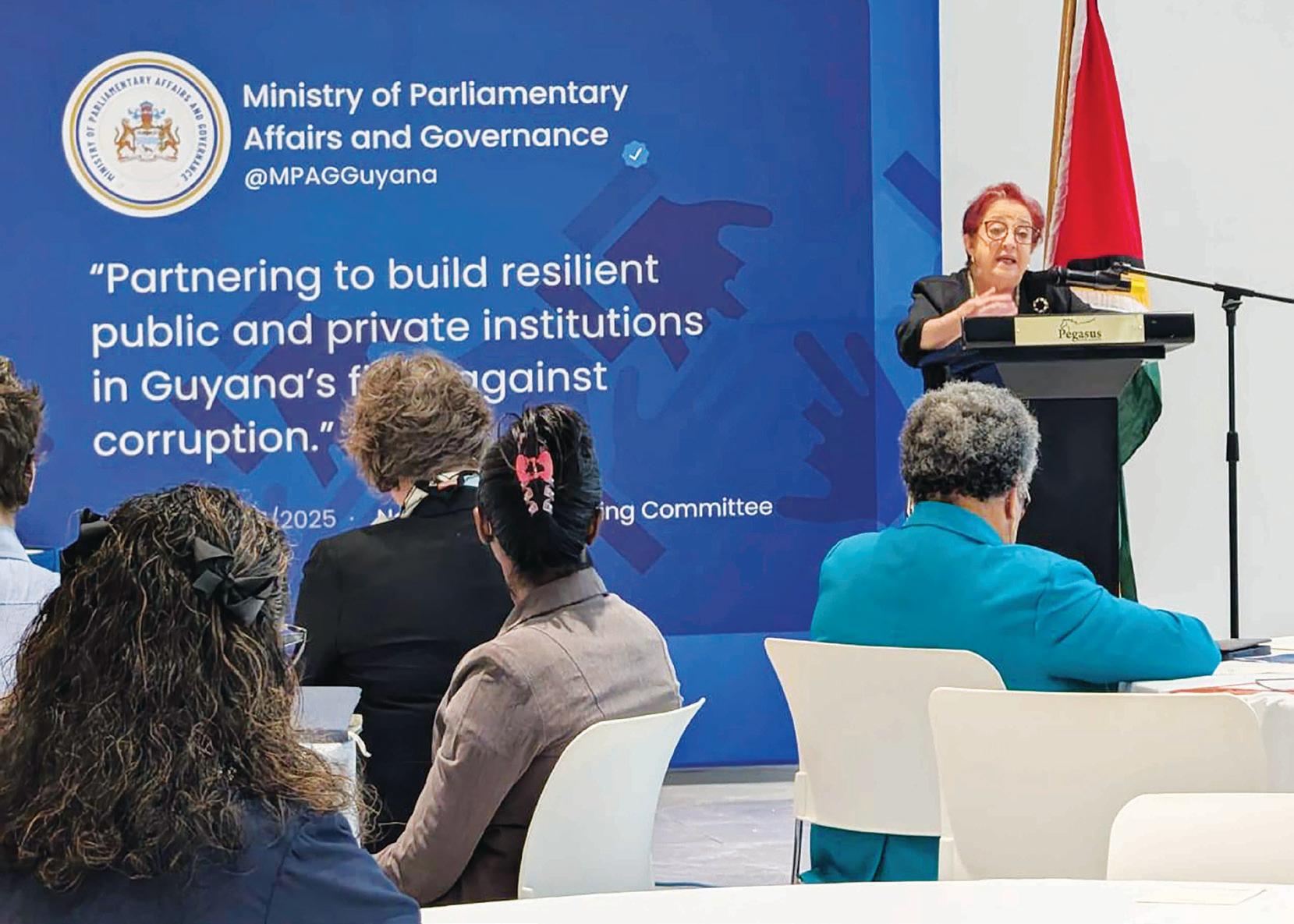
Parliamentary Affairs and Governance Minister Gail Teixeira on Tuesday urged stronger collaboration between Government and business as part of Guyana’s ongoing fight against corruption. She made this call during the AntiCorruption Roundtable Discussion held under the theme “Partnering to Build Resilient Public and Private Institutions in Guyana’s Fight Against Corruption” at the Pegasus Suites.
The one-day forum was convened by Government officials and senior representatives from over 30 private-sector organisations to further ongoing initiatives aimed at enhancing integrity frameworks and strengthening resilience across both sectors. The dis-
cussions centred on several key themes, including ethical auditing practices within private enterprises, the promotion of integrity standards, capacity building to prevent and address corruption, and the exploration of Artificial Intelligence (AI) as a transformative tool to enhance transparency in both public and private institutions. The discussions also examined the progress achieved in implementing recommendations stemming from the periodic reviews of the Inter-American Convention Against Corruption (IACAC) and the United Nations Convention Against Corruption (UNCAC). Teixeira told the gathering that both sectors have important, complementary roles. “The private sector has their own inter-
est in terms of their reputations, their ability to invest, their ability to make profit.” She said the partnership must be one of equals and stressed the importance of private-sector ethical standards. “We want to keep building on that collaboration of partnership, of equals, of the two bodies who have a very important role to play.” The Minister pointed to constitutional and legislative reforms as central to Guyana’s progress in accountability and procurement practices. “The Auditor General no longer had to report to the Minister of Finance; he tabled his report to the Speaker, the Speaker laid it in the National Assembly, it would go to the Public Accounts Committee, the Public Accounts Committee
Nandlall reminded that it was Azruddin Mohamed who got involved in politics after he was already being investigated by the US.
“Which process started first? his political career or the investigation of these charges. The investigation of these charges started in 2017. The charges from which this extradition proceeding span from 2017 to 2024. Was Azrudin Mohamed involved in politics in that time?” Nandlall questioned.
Protecting the interests of Guyana
“The Government of Guyana has made it very clear that we have to protect the interest of Guyana, and we will ensure that the sanctions are observed, and we knew and they knew that the sanctions were not the end that it was just the beginning. That additional processes were coming, and I believe in anticipation of that they entered into poli-
tics, and now they are contriving politics as a façade. To say that it is political.”
Nandlall also addressed concerns over the withdrawal of a local court case involving Mohamed’s alleged falsified declaration in relation to a Lamborghini import.
He explained that the decision was necessary to avoid double jeopardy, as Guyana must clear the way for the ongoing US-requested extradition proceedings.
He emphasised that Guyana’s actions are rooted in its international legal obligations and the need to safeguard the credibility of its gold-exporting industry, which is at the centre of the alleged transnational financial crimes. “We are a gold exporter. We have to protect our own industry,” Nandlall said. “When you use the gold-exporting system to commit a transnational offence, they [Mohameds] know the implications it can have on Guyana’s ability to export gold if appropriate action is not taken by the
Government of Guyana in compliance with our international obligations.”
The AG further rejected allegations that the prosecution team was unprepared or politically influenced, insisting that all necessary documents from the US were duly disclosed and that the court proceedings are being conducted in accordance with due process. The extradition case resumed Monday before Magistrate Judy Latchman at the Georgetown Magistrates’ Courts, where the prosecution tendered several authenticated documents, including a diplomatic note, a declaration from the US Secretary of State, and arrest warrants for both Nazar and Azruddin Mohamed. The matter has been adjourned to November 24, 2025, while both men remain on $150,000 bail each as the extradition process continues.
would then bring their recommendations out.”
Legislative reform
On legislative reform she said, “Our Audit Act of 2004, our Procurement Act 2003 were radical.” Teixeira also highlighted measurable improvements shown in oversight reports. “When it talks about
important anti-corruption platforms that has been created, and the President spoke about it yesterday, the single window platform. Extraordinarily important because we know from different, sometimes anecdotal, sometimes actual, real experience of where the risks are for corruption, bribery, etc.” She tied im-
mental stewardship as part of Guyana’s broader resilience.
“We trade, and we’re looking to have more carbon credit trading because the revenue from our forests and the fact that we’ve not deforested and that we’re a zero-emitting country makes us very attractive for those kinds of
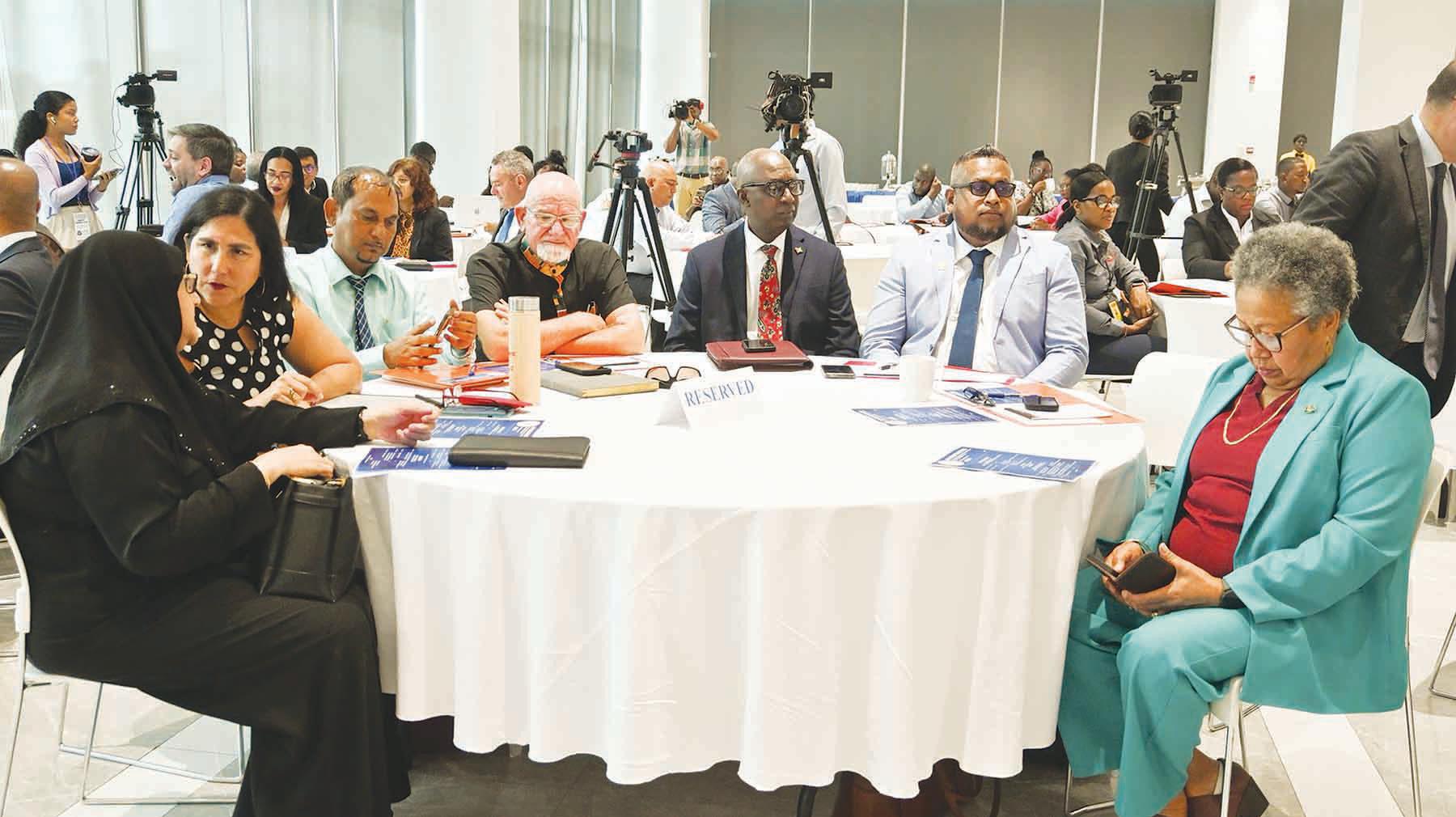
that it’s had 80 per cent of the recommendations being complied with, that’s a major achievement in two years.” She pointed to progress on recovering public funds: “We’re very happy that full recovery of overpayments for three consecutive years, 2022, 23, and 24, was achieved, and that is setting a new benchmark for accountability.”
Digitisation of services featured as a key anti-corruption measure, with Teixeira referencing the new single-window platform and the broader benefits of streamlined access.
“…including one of the
proved access and reduced delays directly to corruption prevention. “So, the access to the services for the public, equitable access, easy access, reduction of long delays is a critical part of reducing and preventing corruption in the Government circles.” Teixeira urged the press to use official oversight reports as the foundation for investigative work. “I call on the media to do good investigative journalism. Good, solid investigative journalism, which means you go to the reports of these bodies.” She also pointed to new revenue streams and environ-
investments in carbon trading.” The Minister stressed continued resourcing of institutions – especially staffing and training – as essential to sustaining gains. “So when we look at Guyana, where we’ve come from and where we are, we have to in all fairness say we have made enormous strides as a country.” Teixeira closed by underscoring the need for vigilance and partnership. “Democracy mustn’t be taken for granted. We have to keep the momentum up, and we have to keep including more, participating with more, and strengthening.


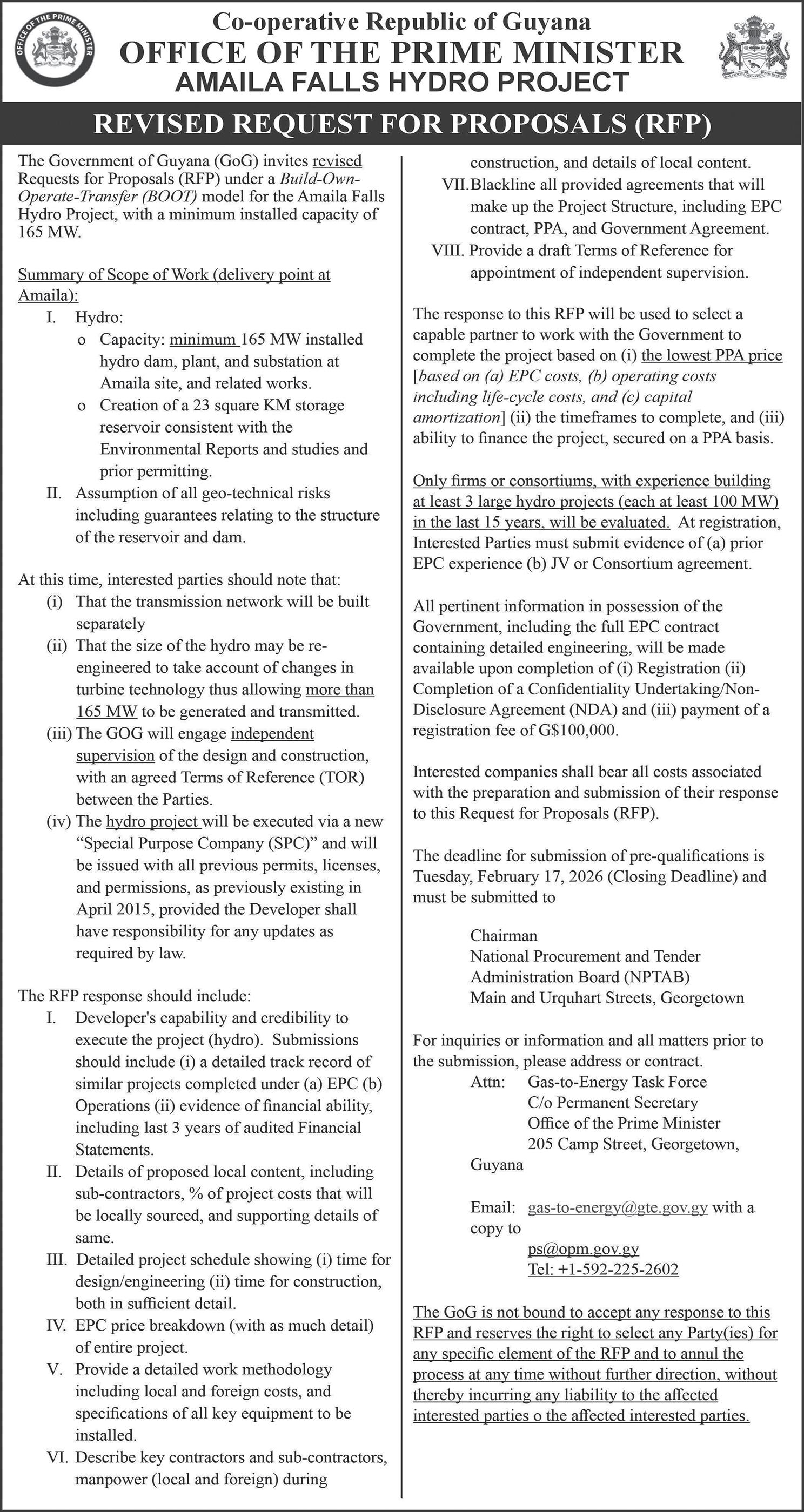


Some folks are getting a tad impatient at the time it’s taking for Sanction Man to be extradited stateside – Miami, Florida, to be more precise – to face the music. The phrase – quite appropriately – originated from the military practice of “drumming out” delinquent soldiers in front of a military band!! But it actually shows we have a robust democracy here in Guyana – 'cause we’re observing its central value – every dog having his day in court!! The “rule of law”, we call it!! It’s not like back in the days of Alice in Wonderland when the Queen would simply order, “Off with his head!!”
Under the rule of law, everyone can challenge even the law under which they’re being arrested!! For instance, by claiming it doesn’t jive with our supreme law – the Constitution!! And no matter how ridiculous the objection is, the courts still gotta hear it!! Remember after forming the government with a 33 to 32 majority over the PPP in 2015, the APNU/AFC coalition went to the courts claiming that Charandass’ crossing the floor to vote with the PPP didn’t matter 'cause “33 wasn’t the majority” of 65?? Went all the way to the CCJ!!
What this means is that Sanction Man and his handlers are gonna try every trick in the book – and then some – to wiggle out from wearing those orange jumpsuits the Yanks favour – because he’s got the money to pay (PNC?) lawyers to be creative!! And it ain’t even just the lawyers!! A couple days ago, one wise guy in the press claimed – after a dozen extradition requests from the Yanks were handled on the basis of the 1931 Extradition Treaty we inherited from the Brits – that oops!! – we never REALLY inherited the treaty! Ignoring, of course, that international law on treaties arises simply from two states accepting a written agreement as valid!! Which is what the dozen cases did!!
Right now, the Magistrate has scheduled the next hearing – where additional evidence to show there’s probably a valid (prima facie) case for the extradition –will be presented. That’s all!! There’s gonna be no TRIAL of Sanction Man and Daady in Guyana – that’s taking place in Florida!! So the question is what if the Magistrate doesn’t think there’s sufficient evidence to justify extradition?? Well, the government has the same right as Sanction Man – to proceed to the higher courts to hear their (conclusive) opinion!!
So either way we should gird our loins with patience –always a virtue in democracies where the wheels of justice may turn slowly – but grind exceedingly fine!! Sanction Man’s gonna get his just desserts – have no fear!!
And those desserts will be served in an American jail!!
…the LOO?
Another thing keeping folks antsy is wondering, where’s the LOO?? No, no, no!! NOT the toilet, which the Brits call the LOO – after the French l'eau (water), which was an allusion to the chamber pot – our “posey” – into which we “passed water” at night!! We Guyanese are (justly) famous for “holding it in”, so what’s keeping them antsy is what’s taking so long with electing the Leader of the Opposition (abbreviated LOO)!!
Most impatient, of course, is Sanction Man, who didn’t even realise he had to be elected by the Opposition MPs!! He thought just because his WIN won the largest number of seats in the Opposition benches – he AUTOMATICALLY became the LOO!! Clearly he wasn’t following politics in 2022 when Norton was elected leader of the largest opposition party, the PNC, but had to wait until Harmon resigned, be sworn in as an MP, and only then be elected Opposition Leader at a meeting called by the Speaker!!
So he just gotta wait on Speaker Manzoor!! Sorry, we’re a democracy!!
…the cash grant
But if your Eyewitness is to be honest – which is his default state!! – what’s on most people’s minds is, where’s the cash grant!! We know that Christmas comes but once a year – and it’s fast approaching!!


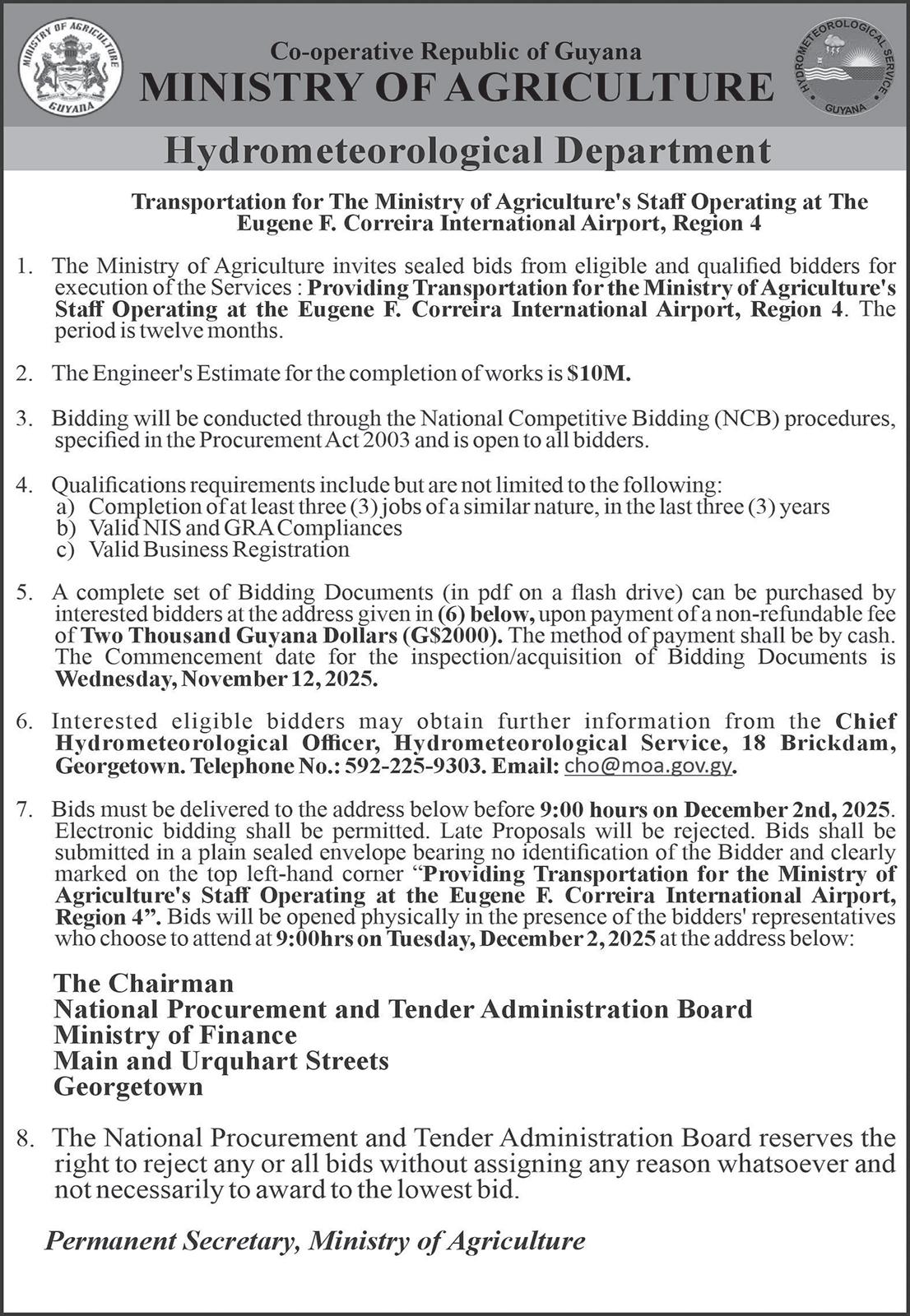
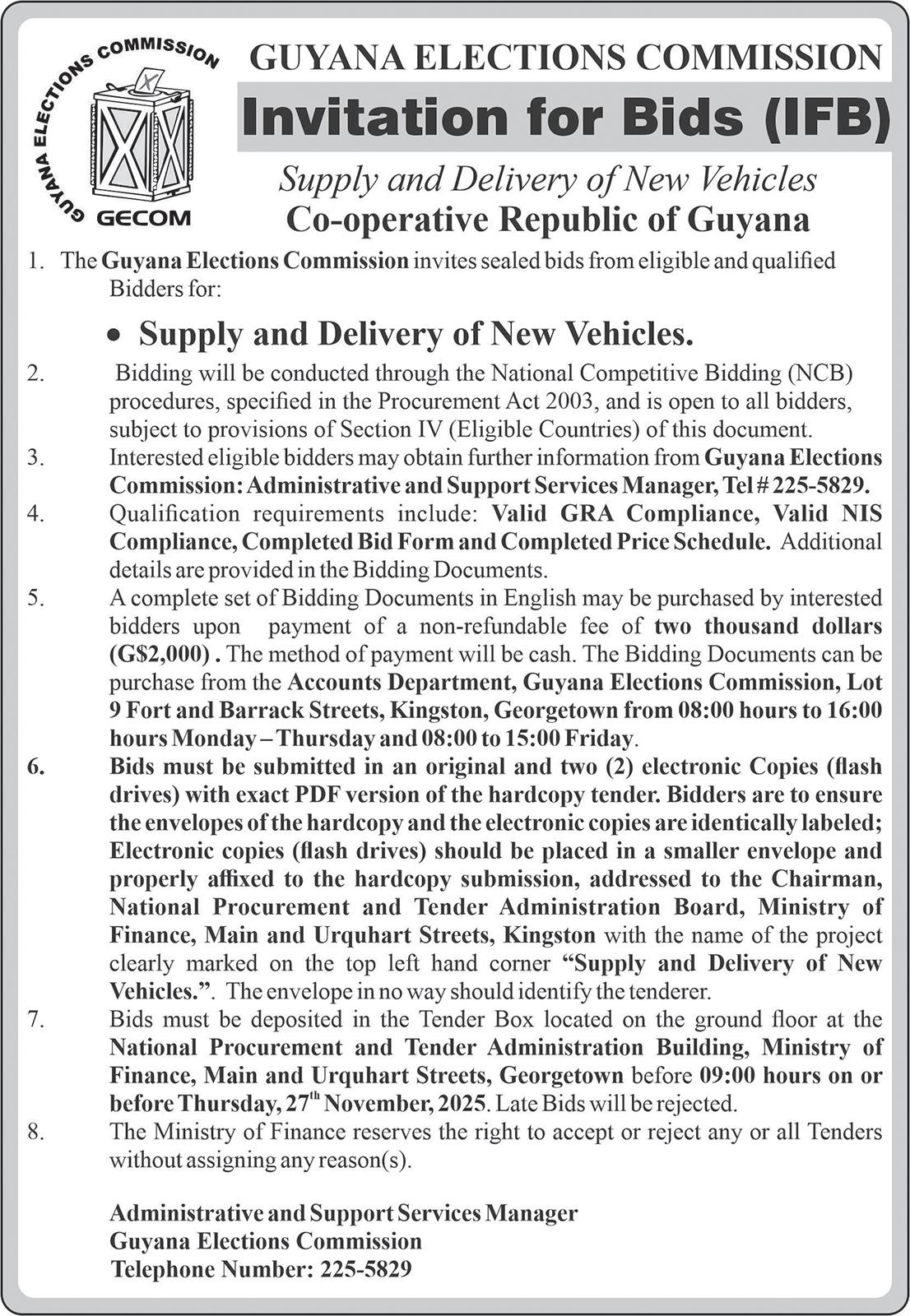


While highlighting progress on prevention and oversight, Parliamentary Affairs and Governance Minister Gail Teixeira warned that delays in the judicial system remain a major obstacle to fully enforcing anti-corruption laws and preserving public confidence.
Speaking at the AntiCorruption Roundtable Discussion on Tuesday, Teixeira said enforcement depends on the courts delivering timely outcomes.
She noted that many corruption matters remain
tied up in the judiciary and that this affects Guyana’s accountability narrative at international reviews.
“We are asked, ‘You reported on these issues three years ago. What has happened?' And we can only say, 'They’re before the courts.' They’re before the courts because we have to also, at the international level, protect our courts.”
Teixeira acknowledged the need to balance judicial independence and international scrutiny while stressing efficiency.
“We can’t go on a lambasting of our courts at the


international level. But at the same time, we have to be more efficient in how we do things and be able to make sure that justice is timely and efficient.
She placed the courts as the final, critical step in the anti-corruption continuum.
“If we’re going to deal with the continuum of anti-corruption, prevention, reduction, enforcement, and investigation, enforcement, then we have to deal with the last leg of it. And that is the issue of how these matters are addressed in the courts of Guyana.”
The Minister said timely adjudication is needed so Guyana can show progress to bodies such as the United Nations (UN) and the InterAmerican Convention Against Corruption.
“We have signed the UN Convention Against Corruption in 2008, and we’ve just finished our sec-
ond assessment in 2024 and 2025 this year and are awaiting the final executive summary.”
Teixeira urged that prosecutorial, investigative, and judicial capacity be strengthened as part of the country’s next steps.
“Two of the areas we’ve signalled, two in our reports to the UN and the MSC, has been requesting support in the prosecutorial, investigative, and judicial areas.”
She noted that enforcement must match the pace of prevention and oversight.
“For every corrupt act, for example contracts, means that money that should have been used for quality buildings, quality roads is syphoned off… So, the issue of oversight and ensuring that we’re able to reduce opportunities is important.”
“Justice must be timely and efficient.”

President Dr Irfaan Ali on Tuesday disclosed that the Guyana Government is working on developing a major glass manufacturing industry, utilising the country’s high-quality sand.
Speaking during the Berbice Development Summit Agenda, he said the goal is to produce high-quality glass that can be used in the automobile and other lucrative industries.
“…that is linked to the quality of sand that we have… We are historically known to give you the finest beaches that you enjoy around the region, with Guyanese sand, but we want to add value to that high-value commodity with the gas and create this whole new industry and hub around us here in Guyana,” the president said.
The development of the glass factory is part of the Government’s plans for the Wales Industrial Zone,
which will also feature a data centre and an ammonia/urea (fertiliser) plant.
A few years ago, the InterAmerican Development Bank (IDB) launched a feasibility study on the possibility of establishing a glass manufacturing facility in Guyana.
The Guyana Manufacturing and Services Association (GMSA) has been pushing for the development of a glass factory in the country.
In fact, GMSA President Rafeek Khan recently noted that Guyana currently imports all of its glass bottles used in local industries, something which, he said, could be produced locally.
Glass is made by melting a mixture of sand (silica), soda ash, and limestone at very high temperatures in a furnace, which turns the raw materials into a molten liquid. This liquid glass is then shaped into different products.

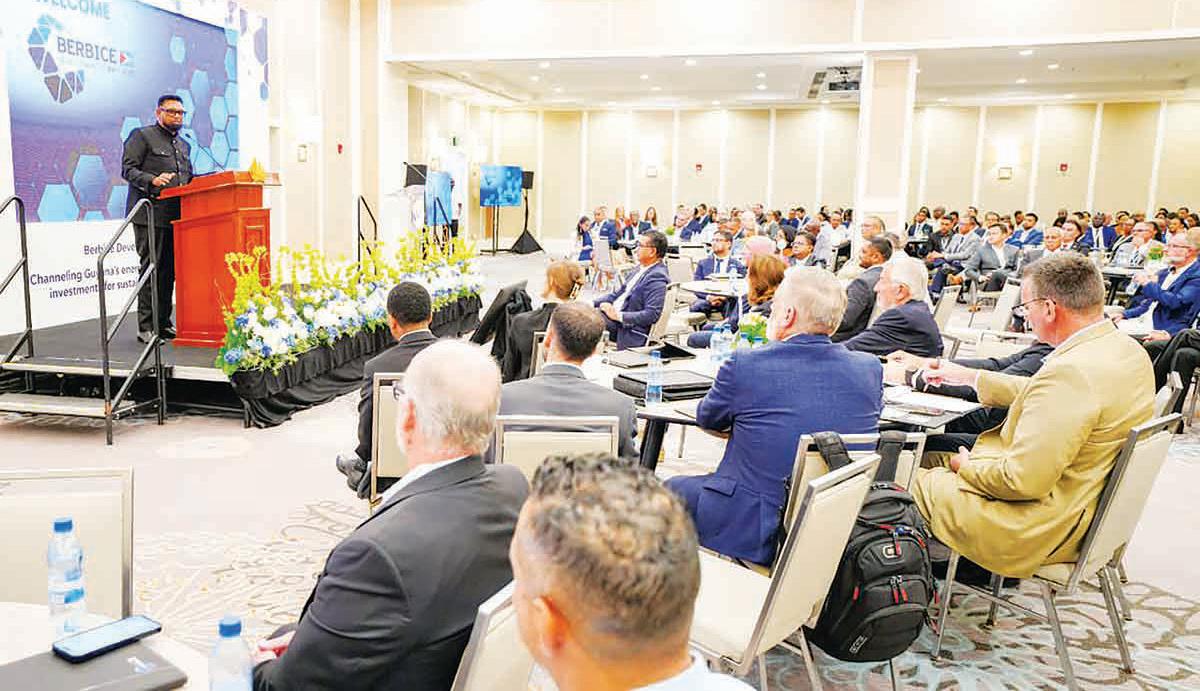
President Dr Irfaan Ali has made it clear that Guyana’s gas monetisation plan must be implemented before the end of his term in 2031, asserting that “any option that does not allow this country to monetise gas before 2030 will not have the type of support I would like to give.” The Guyanese leader made this declaration on Tuesday as he addressed the Berbice Development Summit Agenda – an event which saw investors from around the world gather to explore how Berbice can stand at the forefront of Guyana’s next industrial and digital revolution.
President Ali said the strategy for Guyana’s gas development – touted for Berbice – must include minimal debt financing for the country but maximum foreign direct investment and private sector participation.
It must also maximise local, regional and diaspora participation while optimising value, resilience, sustainability and reach, the President added. Additionally, the plan must drive innovation and support local business development, President Ali said, emphasising that it must also lead to the monetisation before 2030. “I am not willing to push monetisation beyond 2030. Constitutionally, I have an election in 2031, and I can’t run again, and I’m not leaving this decision for anyone after me… So any option that does not allow this country to monetise gas before 2030 will not have the type of support I would like to give,” President Ali asserted. While acknowledging that he is not an expert on gas, the Head of State noted that he is an attentive reader and listener. Based on the technical advice he has received,
he has narrowed down several options for further pursuit. One scenario, he said, is to extract the highest possible value from every molecule of gas. “Here, gas fractions are separated and each converted into high-value export products. Methane feeds a blue ammonia-urea-methanol complex, where carbon dioxide from hydrogen production is reused in urea. Then you have a liquefied petroleum gas – propane and butane – supply a mixed feed steam cracker, a gas-powered data centre campus, which has digital export and new technology jobs,” he outlined, noting that this scenario has the highest value creation. Scenario two is the highest employment and inclusion option. President Ali explained that “the purpose of this highest employment and inclusion scenario is to create maximum number of
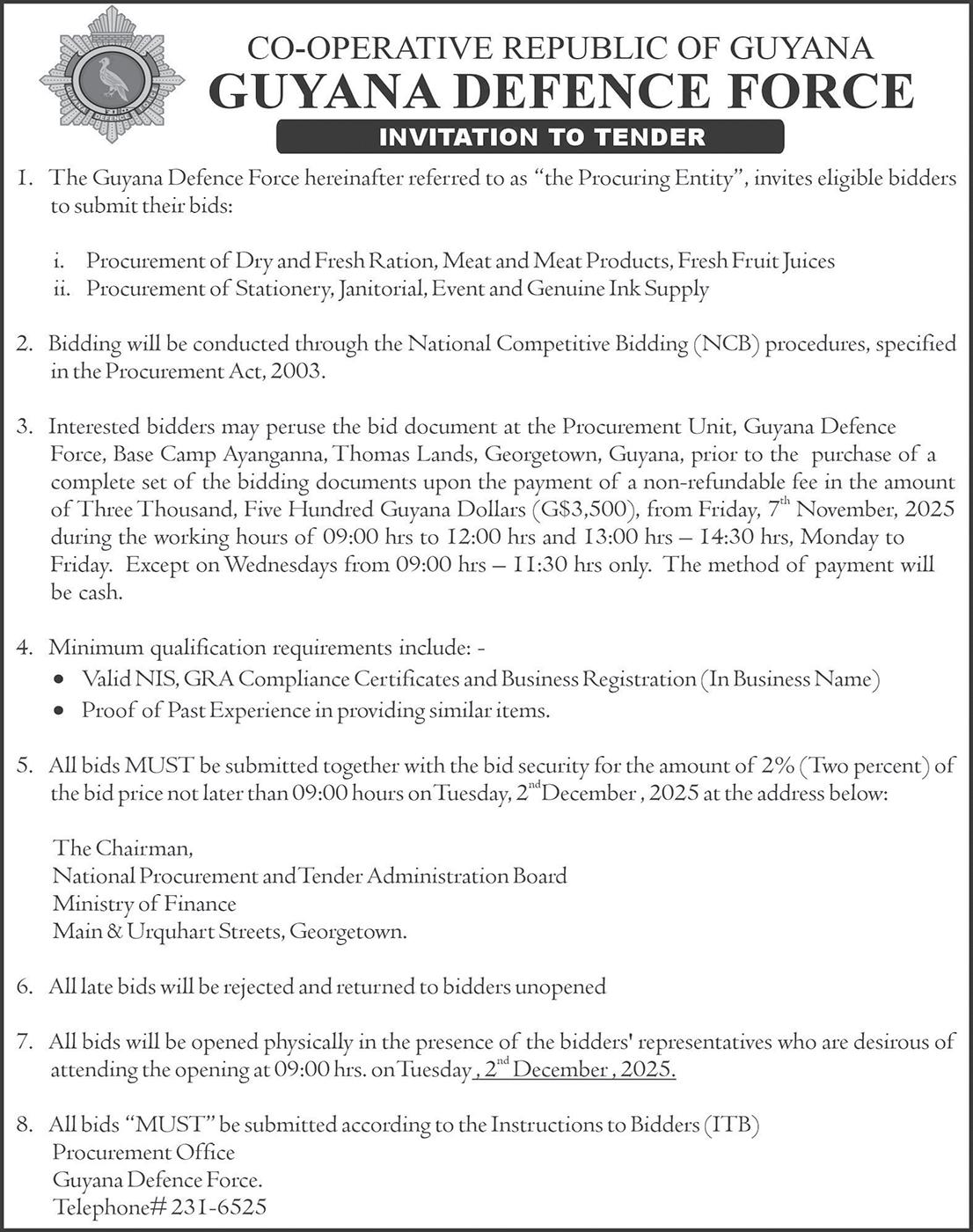
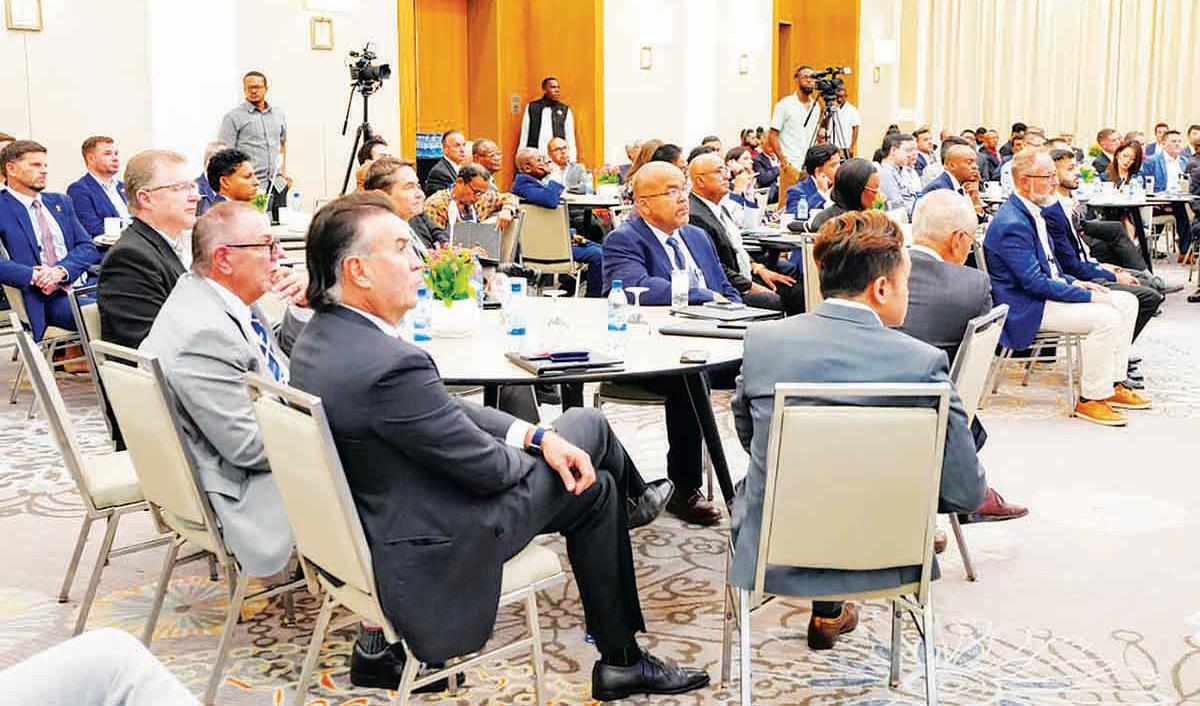
jobs and the broadest local participation. This scenario diversifies across several mid-scale industries within the corridor: gas powers and heats, and heat plants for fertiliser, steel using gas-based direct-reduced iron, cement and glass, alumina, agro-processing, and cold storage, and a digital hub.” Scenario three, which he outlined, uses lowcost, reliable gas energy to transform Guyana’s own raw materials into finished goods. “This is cheap and stable gas energy, drives industries that upgrade domestic resources, cement and lime from limestone, glass and ceramics from sand, alumina from bauxite, and fertiliser from methane and captured CO₂. These industries feed construction, mining, and agriculture. Power and heat are generated internally within each plant, not from a separate utility,” the President
noted. Scenario four is mega-scale development. “A single gas complex would monetise every gas fraction on one site. Methane feeds blue ammonia, urea, and methanol production, mixed feed system cracker and PDH unit to produce plastics. All CO₂ is reused on site, and the complex includes its own desalination, water recycling, and export jetty. This project anchors a national petrochemical brand and attracts downstream investors,” the Head of State noted.
In this regard, the President noted that every fraction of Guyana’s gas can be transformed into high-value products and jobs.
“Whether the priority is maximum export value, maximum employment, domestic transformation, or a single mega-project, each scenario builds on the same foundation,” he expressed, adding
that there are several options that can be explored. “Option one, the strategic Berbice investment, is a two-gigawatt data centre, two MTPA alumina, and one MTPA gas facility. A liquid natural gas LNG plant, option two, and option three, an LNG plant and data centre. Then we have another option: a Berbice region nearshore, modular and scalable gas processing, NGL and LPG facility, physical and/or virtual pipelines, small-scale LNG to supply gas throughout the region, centralised operation, an LNG depot in Berbice serving as a logistical backbone for small-scale LNG, an ISO container distribution for future industrialisation of the region, and then a worldclass, this one brings together a world-class consortium as an option. So, these are the options that are before us.”
TURN TO PAGE 14


WEDNESDAY, NOVEMBER 12, 2025| GUYANATIMESGY.COM
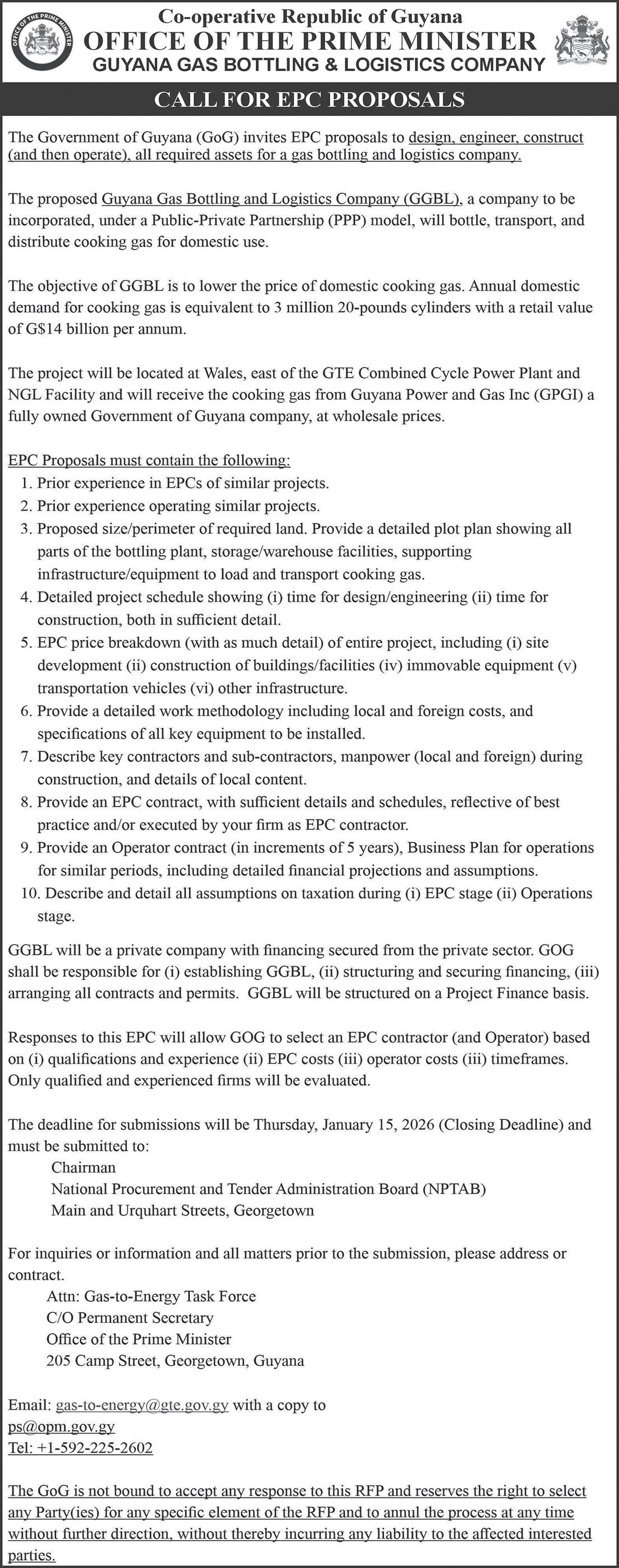
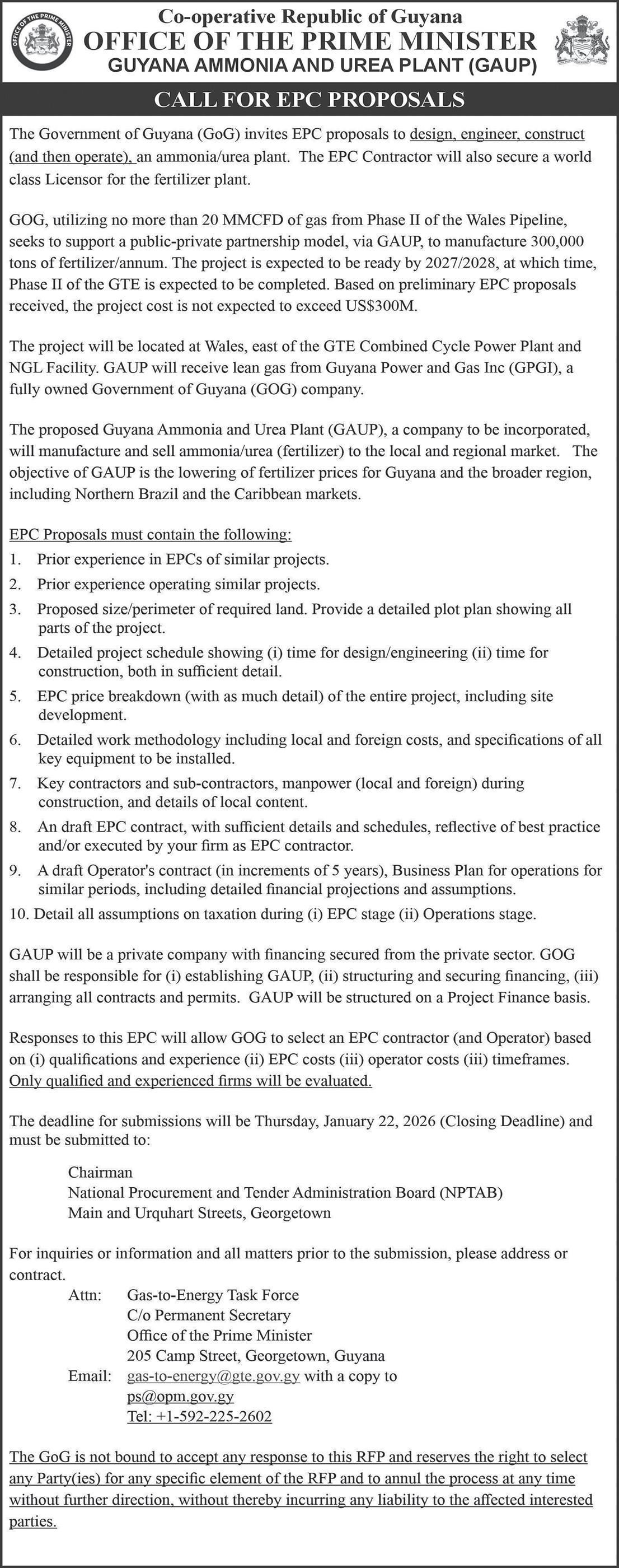


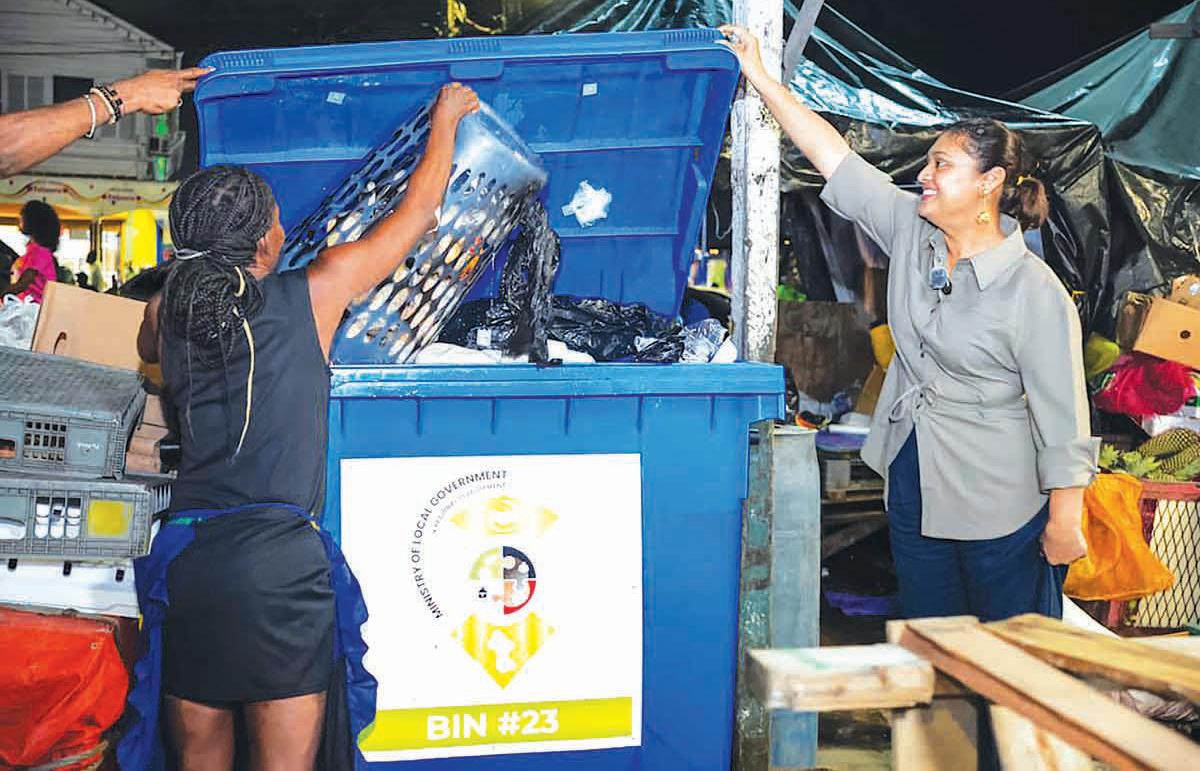
The Local Government and Regional Development Ministry on Monday evening launched its community-focused “Going Forward” initiative at the Stabroek Market Square, introducing a cleaner, more organised environment through the strategic placement of garbage bins at 40-foot intervals across the busy commercial area.
To maintain a clean environment, garbage collection will take place twice daily, between 13:00h and 15:00h, and again between 16:00h and 18:00h. These targeted collection windows are designed to align with market hours and waste build-up patterns, ensuring that the surroundings remain clean and accessible for vendors, customers, and passers-by. The Local Government and Regional Development Minister, Priya Manickchand, emphasised that the Ministry’s approach is one rooted in partnership rather than punishment at this stage. She stated that at this point, enforcement will not be the immediate focus. Instead, the Ministry will engage with citizens to promote behavioural change and civic responsibility.
“At this point, we will not bring enforcements. We will talk to our brothers and sisters, to the people using this square, we will talk to the passengers. We’re going to work with each other and work on each other to change the bad habits we have come to know – the bad habits of littering,” she said. This sentiment reflects a national call for civic responsibility, supported by enabling infrastructure. The Minister highlighted that the Government sees value in supporting vendors – not only by keeping their workplaces clean, but also by fostering conditions that allow their businesses to grow and flourish. “Let us go first and show this country how we can cooperate once we have the facilities to keep Guyana clean.
I promise you that in me, you have a friend – and in the Government, you have a Government, a President, and a Cabinet who want to see you thrive. We want to see your business do well. We want to see you make sales, build your house, buy assets. We want to see you do well, and we want to create an environment where your businesses can thrive. And this is a beginning,” she expressed. The evening also served as a reminder that change is most effective when built collectively. Vendors expressed appreciation for the opportunity to be consulted and included in shaping improvements to their work environment. The atmosphere was one of collaboration, shared purpose, and optimism about the continued revitalisation of Georgetown’s iconic public spaces. The Ministry encourages all vendors and market users to utilise the bins provided, observe proper waste disposal practices, and continue to work together as this effort unfolds. The Stabroek Market Square, like the city itself, reflects the habits and pride of its people. Maintaining it as a clean and vibrant space is a shared responsibility, one that benefits livelihoods, strengthens community wellness, and enhances the national image of Georgetown. Monday’s community-centred engagement was led by Minister of Local Government and Regional Development, Priya Manickchand. She underscored that Stabroek Market is not only a commercial hub but also a living symbol of the nation’s culture, history, and resilience. The vendors who earn their livelihood there are a vital part of the city, and their cooperation is essential to sustaining a thriving and environmentally healthy market environment. As part of this renewed effort, the Ministry is placing garbage bins around the Stabroek Market Square at intervals of forty feet.
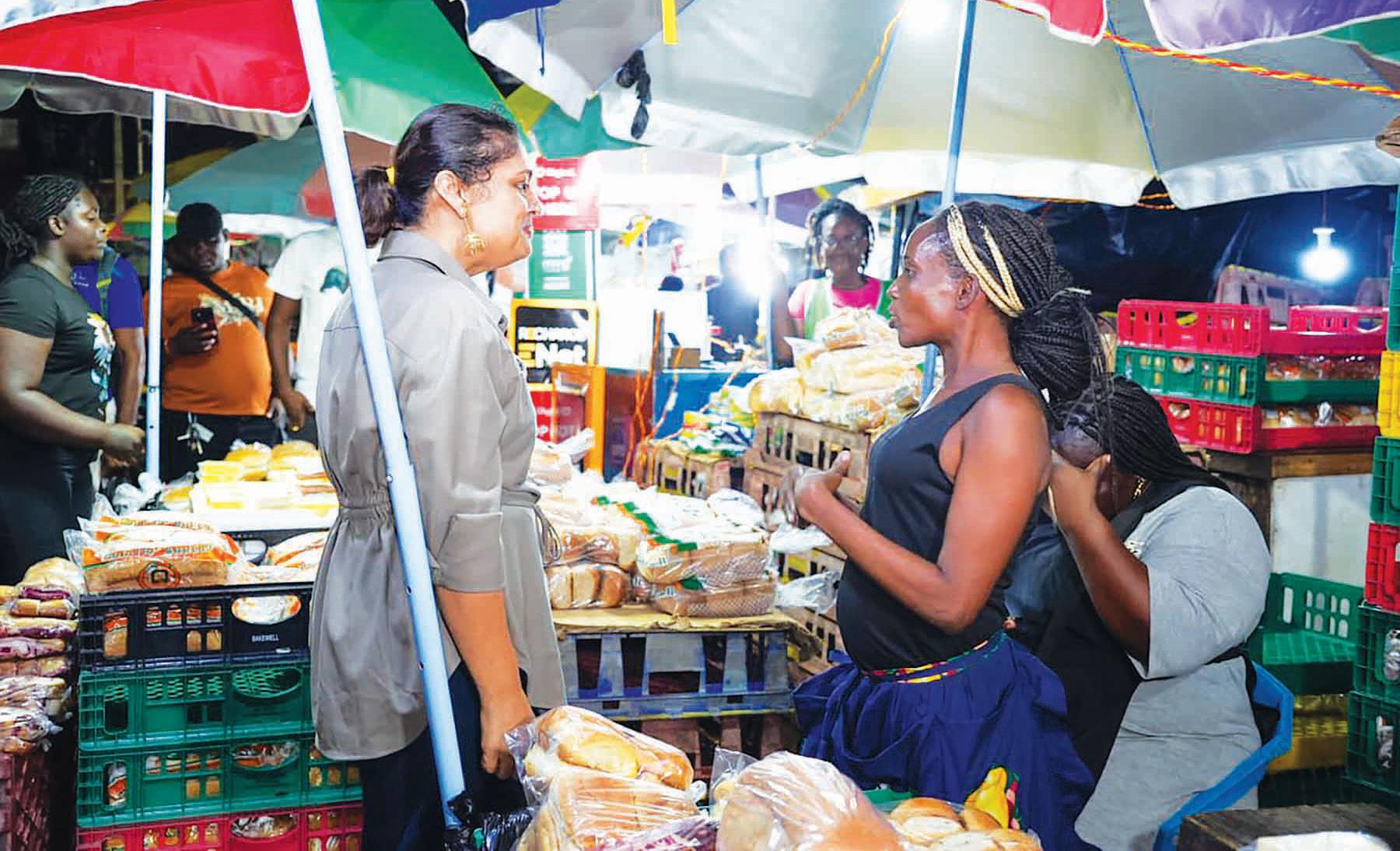
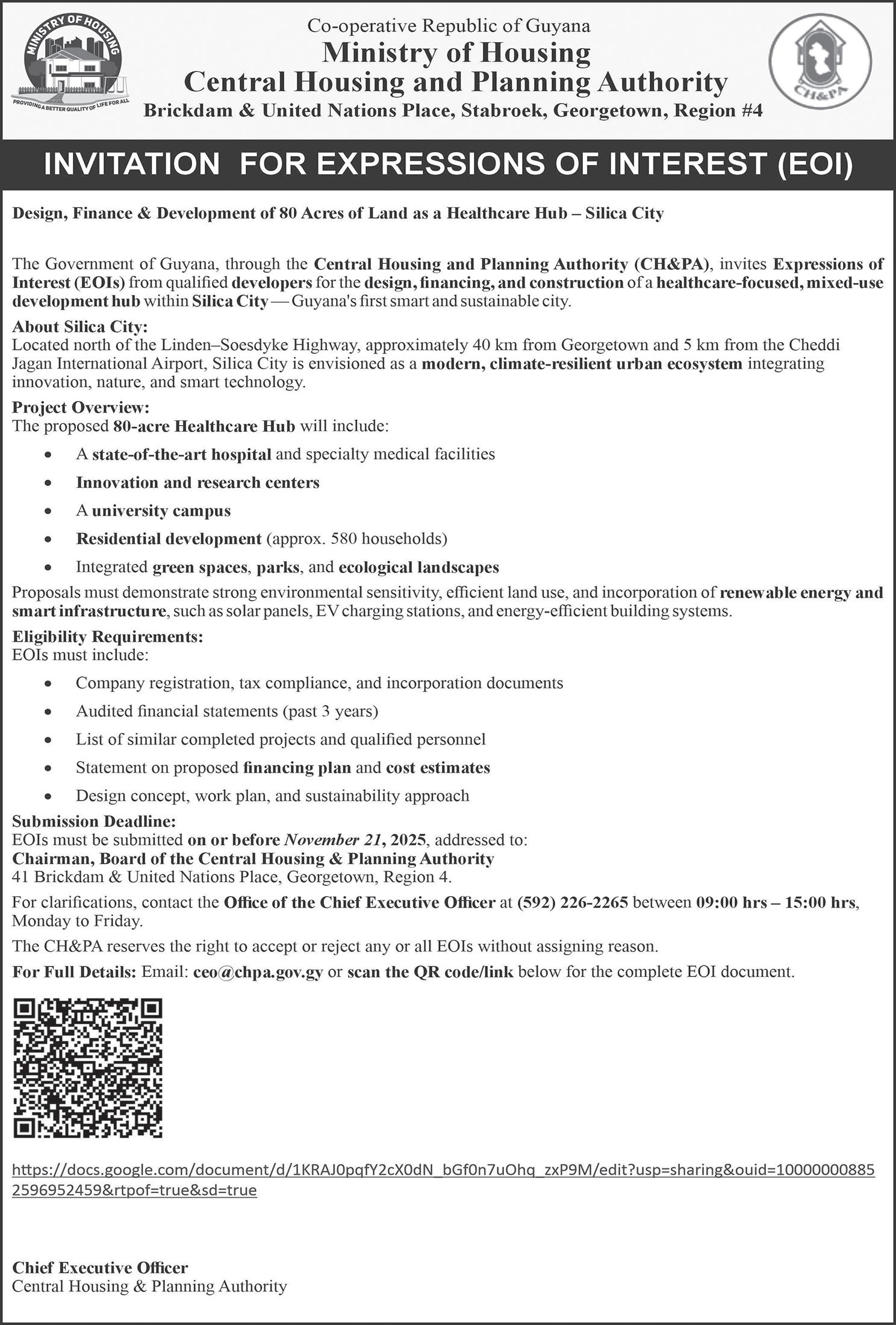

The Government of Guyana, through the Central Housing and Planning Authority (CHPA), has announced the invitation of Expressions of Interest (EOIs) from qualified developers for the design, financing, and construction of an eco-focused retirement resort in Silica City, Guyana’s first smart and sustainable city. The proposed site is located north of the Linden–Soesdyke Highway, approximately 40 kilometres (km) from Georgetown and 45km from Linden.
According to the CHPA in an advertisement published in today’s newspapers, which was also published last month, the project will span 20 acres and will cater to residents aged 60 and above, offering a sustainable and wellness-orientated living environment consistent with Silica City’s broader green vision.
The planned development will feature 40–50 individual eco-homes ranging between 500 and 600 square feet, a wellness and outpatient clinic, a community kitchen and dining hall, a community garden, renewable energy systems (including solar and wind installations), as well as native trails and a forest buffer to maintain environmental balance.
Interested developers are required to demonstrate capacity and experience in designing and developing retirement or senior-living

communities, applying sustainable and low-impact spatial design, integrating smart technologies and renewable systems, and financing and delivering design–build projects.
Submissions must include certified business registration and GRA/VAT compliance, audited financial statements for the past three years, a statement of financial capacity and proposed financing, evidence of relevant project experience and technical expertise, along with a conceptual design and work programme.
The deadline for submission is November 21, 2025, and EOIs should be addressed to the Chairman, CHPA Board, 41 Brickdam & United Nations Place, Georgetown.
Silica City is the Government’s city project up the Soesdyke/Linden highway that is expected to be fully developed by 2030. President Dr Irfaan Ali had previously said that Silica City will feature 15,000 families and an emphasis on technology, wellness and environmental sustainability. Conceived in 2009 and located on the SoesdykeLinden Highway, Silica City will be Guyana’s first modern, sustainable city. In August 2024, President Ali announced the completion of the planning model for Silica City, which forms part of his Government’s climate change mitigation initiatives under the Low Carbon Development Strategy (LCDS).
In November 2024, Ali

met with an executive team from Republic Bank Guyana to discuss collaborations on a number of innovative proj-
ects, including the Silica City project. In February 2023, a $2.1 billion contract was inked to develop Silica City. It is envisioned that, over the next two decades, this new secondary city along the Soesdyke-Linden Highway would grow to hold more than 12,500 households.
It would initially cater to just over 3000 households in the first five years, but 3800 acres of land have been earmarked for the new city. The first phase of the project would see an initial 400 Young Professional homes being constructed. It was previously reported that the Housing Ministry had already begun shortlisting persons for these homes. In fact, construction has already commenced on the
first 110 Young Professional homes in the city, and these works were 50 per cent complete as of November last. The city will have highend developments, including smart homes with the newest energy-saving technologies for wastewater management, energy management, and water conservation. The city will have recreational parks, community centres, an electricity grid, and a multi-speciality health facility.
President Ali’s announcement that Phase Two of the city will focus on diaspora investments comes as the People’s Progressive Party/ Civic (PPP/C) Government has been pushing for the diaspora to come home and invest.
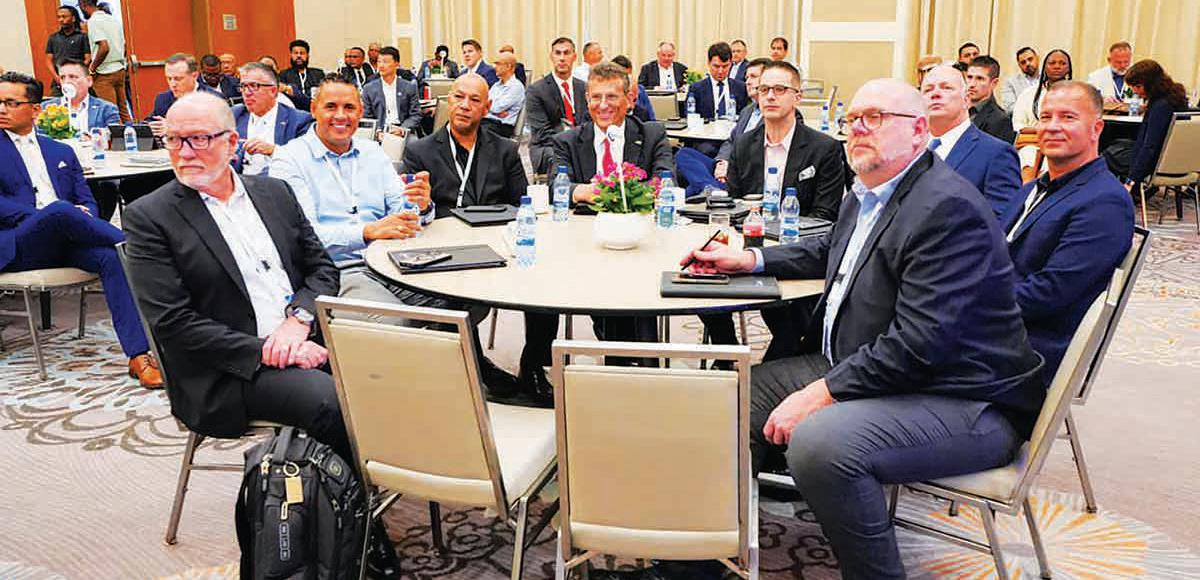
Berbice development agenda
Meanwhile, in emphasising the importance of the Berbice development agenda, President Ali highlighted the potential it unlocks for Northern Brazil, particularly the states of Roraima and Manaus – two of the country’s fastest-growing states. Noting that their greatest disadvantage is the journey to get goods into the Atlantic, President Ali outlined that “Guyana offers the opportunity to reduce their time to the Atlantic substantially to the point where the deep-water port in Guyana will position these two states as the most
competitive states in Brazil.” Meanwhile, the outcomes of the Berbice Development Agenda Summit will feed into the upcoming Energy Conference in February 2026, at which point, the President said, a decision must be made. “…where we will be launching out the investment platform to put all of this together and to advance the work forward,” he said. The President emphasised that there is no time to be wasted. To demonstrate how serious he is about this, the Guyanese leader shared a story of how he addressed two of his Ministers who sub-
mitted a ‘nonsensical’ idea to him.
“My Minister of Finance and Minister of Public Service, Government Efficiency and Implementation came to me with an idea that I threw them out of the State House yesterday, and I asked them not to bring nonsense to me again because I have outlined a vision, the People’s Progressive Party Civic (PPP/C), we’ve outlined a vision of what we want to accomplish, and we have to do it,” he noted.
The country’s gas resources are estimated at 17 trillion cubic feet (tcf).
The installation of bins stretches from Brickdam Street, starting at the Head of Avenue of the Republic, down to Stabroek Stelling; continues along Lombard Street in the vicinity of the market; extends along Water Street from Stabroek Market up to America Street; and runs alongside the perimeter of the Ministry of Human Services and Social Security. These bins are intended to provide consistent and convenient waste disposal points, reducing littering and ensuring that waste is properly contained rather than scattered throughout the market space. Giving
his response to the initiative, Deputy Permanent Secretary Dr Josh Kanhai described it as a “power move” by the Ministry. “It’s basically a power move. There is nothing better that could be done – it’s a common-sense move, and it’s something that the Ministry of Local Government has thought through. With this move, I expect everyone in the Stabroek area – whether vendors, pedestrians, or passengers – to play their part.” He added, “If you’re holding your child’s hand and he has an ice cream bag or a snow cone cup, encourage him to throw it in the
bin. He might not be able to reach that big bin, so set the example as a parent – pick it up and throw it in for him,” Dr Kanhai urged. Speaking to the vendors gathered, several expressed that they, along with others, need to play their part as partners in preserving the space. The engagement was attended by the Ministry’s Deputy Permanent Secretary (Administration), Dr Josh Kanhai; the Permanent Secretary, Miguel ChooKang; the Mayor of Georgetown, Alfred Mentor; councillors; technical officers; and staff from the Ministry.

M“Look out for those who are not looking out for you” – cops tell Region 9 e-bikers

Dr Leslie Ramsammy
any years ago, President Bharrat Jagdeo decided that the central government had to intervene in Angoy’s Avenue, New Amsterdam, one of the largest squatting communities at the time, where thousands of people were living with mud dams, no electricity, and no water. The squatting community started under Forbes Burnham and the PNC. I was one of the ministers sent to work with citizens to regularise their status and to ensure water and electricity were made available to the people. Once the transformation started, the then Mayor objected, insisting that “no minister or central government could come into his town and work with people to change anything”. His arrogance made him blind to the fact that in his town people were living like animals.
President Irfaan Ali announced recently that enough was enough. President Ali had had enough of the ineptitude and disinterest of the Mayor and City Council of Georgetown. He announced that he will work directly with the citizens and stakeholders in the city to begin a transformation to make Georgetown an iconic city once again. Like the Mayor of New Amsterdam two decades ago, the Mayor of Georgetown insists that it would not happen under his watch. As reported by Demerara Waves, the mayor stated that “as the democratically elected representatives of Georgetown, we insist that the Central Government engage in formal, transparent, and structured consultation with the City Council – and through us, with the people of this city – before any further steps are taken.” A mayor who is not doing his job decides he is king.
Georgetown is a city that is widely acknowledged as the worst, the dirtiest city, in CARICOM. But the mayor would rather do nothing to improve the city, leave garbage everywhere, and leave the city vulnerable for flooding even when it drizzles. It is true that today, most of the streets in Georgetown are in good condition and that some main roads have been reconstructed. But it is the Central Government that has done this work. The mayor and his city council have done nothing to improve the roads. But he demands President Ali desist from improving the city.
In the 1940s and 1950s, Georgetown was regarded as the Caribbean’s “Garden City”. This was before Forbes Burnham became the Mayor in 1959. He continued as Mayor until 1966. Burnham’s party, the People’s National Congress (PNC), in one form or another, has been in charge of Georgetown for 66 years.
In the span of the last 66 years, beautiful Georgetown degenerated from being the Caribbean’s Garden City to the Caribbean’s “Garbage City”. We would be lying if, as citizens of Guyana, we did not admit to ourselves that we have heard stories of how Georgetown stinks and is the poster child for a “gutter” city told by visitors over and over again, by our visiting relatives, and among ourselves. This is a regurgitated refrain among residents of Georgetown and visitors, both local and international.
This sad state of Georgetown is the legacy of the one political party that has held hegemony in Georgetown for more than 66 years. Mayor after mayor comes and goes, making promises that they never keep, having no plan or interest to regain the title as the Garden City of the Caribbean, or knowing how to transform our city into a modern metropolis. It is not merely that Georgetown is dirty, smelly and full of garbage; it is also that the city is run-down and looks derelict.
Central Government allocations to the city have been misused and unused. The USAID had to take back monies allocated to the City Council to rehabilitate the City Hall. Iconic sites like the Stabroek Market and the Bourda and La Penitence Markets, despite major investments by the Central Government, are disgraceful. The City and Mayor of Georgetown buildings have been left to fall apart. The iconic City Hall Building was an eyesore until recently when it was rehabilitated by Central Government investment.
The drains, sluices, and pump stations have been left without maintenance, leaving the city vulnerable every time rain falls. The pavements, parks and cemeteries are left with bushes. Garbage is everywhere, with the city defaulting on payment to garbage carriers. The city stinks to high heaven.
No responsible central government can leave the city to continue with this disgrace. President Irfaan Ali has personally become involved and has instructed a team of engineers and other stakeholders to develop a plan. Starting this week, the President himself is leading comprehensive consultations with citizens, the private sector and other stakeholders. There has been an aggressive awareness campaign to ensure that citizens in all the constituencies in Georgetown know of the consultations. Businesses and other organisations have been invited. The mayor and city council know of these consultations. They do not need special invitations to attend these consultations.
In response, the mayor demands that the President must abort this plan and must go through him. The mayor and town council have responsibilities that they have failed in. They, therefore, have a duty to cooperate with the President to transform the city. Instead, they demand veto powers.
The opposition parties, particularly the PNC-led APNU, have a dutybound responsibility to attend these consultations and help build the plan to transform Georgetown. The question is whether they will be responsible or obstructionist. Given their history, none of us would be shocked if they chose the obstructionist path. Just like Aubrey Norton refused to shake the hands of the President a few years back, we can predict they will turn their backs on helping to make Georgetown an iconic city again.
The citizens say enough is enough. The citizens say that we must support the president because we want Georgetown to again be CARICOM’s “garden city”, the Caribbean’s iconic city again.

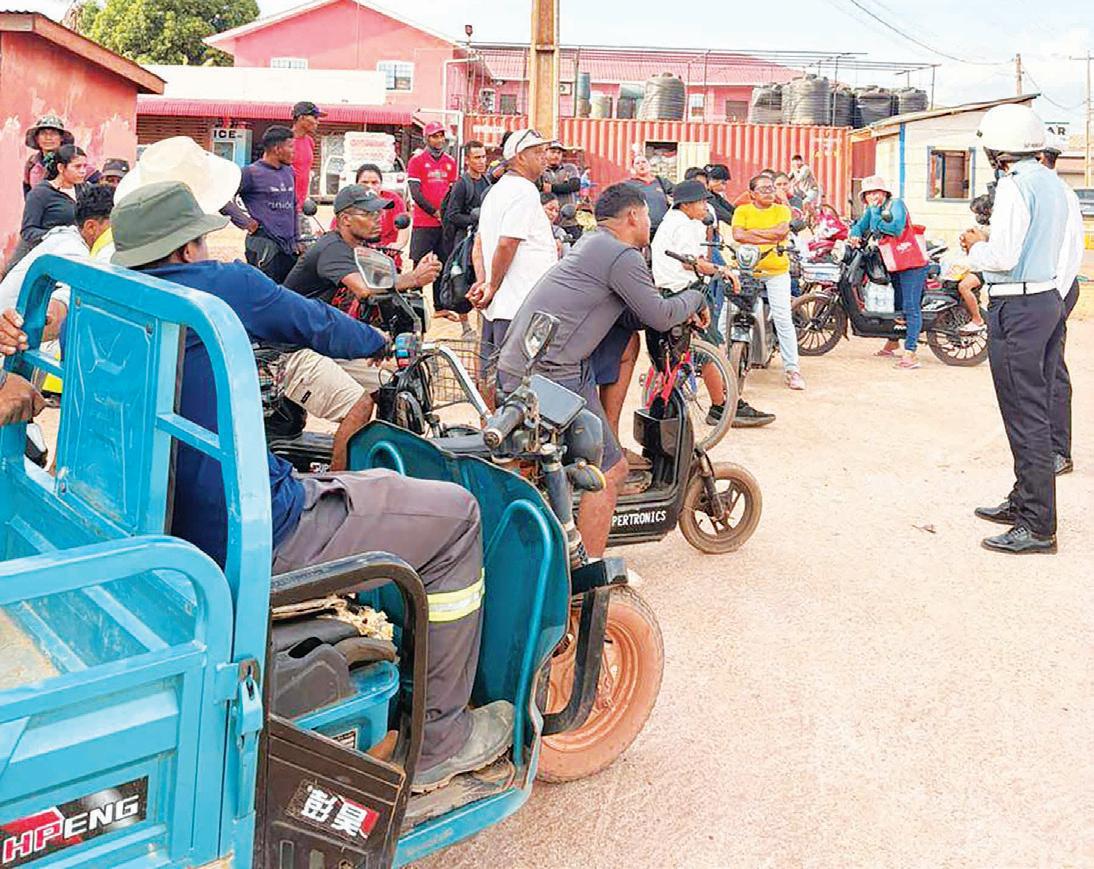
Ranks from the Lethem Police Station Traffic Department on Monday conducted an educational session for electric cycle (E-cycle) owners within the township, focusing on
traffic regulations, safety, and responsible road use. The session, held on November 10, was led by Sergeant Persaud, Constable Joseph, and other traffic ranks. The initia
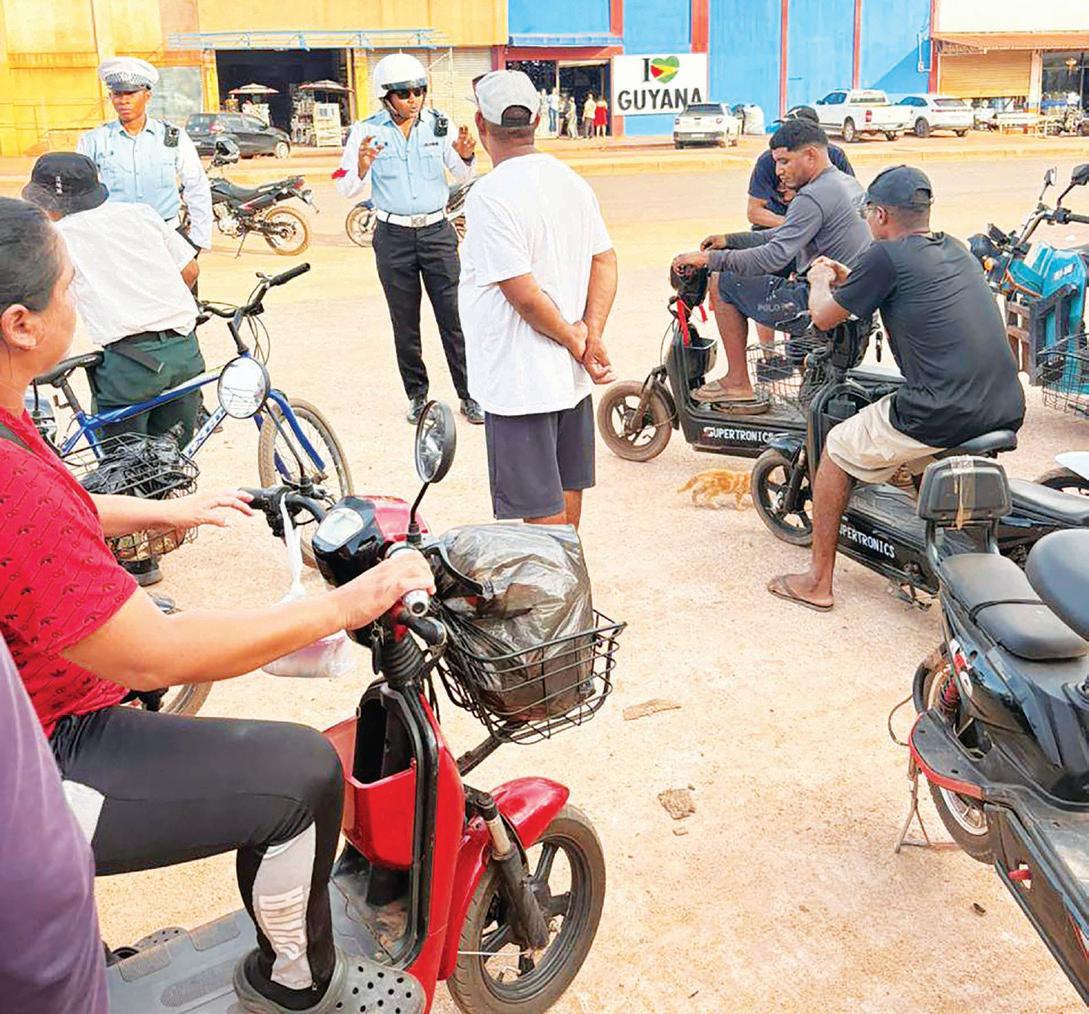
tive formed part of ongoing efforts to promote compliance with traffic laws and ensure safer roadways for
users



Linden Police are investigating the death of 30-year-old Kevin Alexander, of Block 22, Wismar, Linden.
Reports are that the carpenter was stabbed at his residence on Monday, at about 21:45h.
Preliminary investigations indicated that Alexander and his 28-yearold girlfriend, a housewife residing at the same address, were involved in an argument during which the suspect allegedly stabbed him once in the left side of
his abdomen. Alexander was reportedly assisted by relatives and public-spirited citizens and transported to the Linden Hospital Complex, where he was pronounced dead on arrival.
The suspect has been arrested and is currently in Police custody. Alexander’s body has been taken to the Gjetsco Funeral Parlour, where it awaits a post-mortem examination.
Police are continuing their investigations into the circumstances surrounding the incident.
Justice Gino Persaud on Tuesday granted bail in the sum of $750,000 to Fawaaz Barakat, one of the three men charged in connection with the 16.784-kilogram (kg) cocaine bust at MovieTowne, Turkeyen, East Coast Demerara (ECD). As part of the bail conditions, Barakat is required to lodge his passport and all travel documents with the court and report to the headquarters of the Customs AntiNarcotic Unit (CANU) on the first Monday of every month until the hearing and determination of his case. The decision came after Attorney-atLaw Bernard Da Silva successfully moved to the High Court for judicial review of an earlier ruling by Senior Magistrate Clive Nurse, who had denied bail to Barakat. Barakat, 34, of Ocean View Drive, Ruimzeight Gardens, West Coast Demerara (WCD), was jointly charged with Collin Moore, 35, of Prince William Street, Plaisance, ECD, and Martin Gomez,
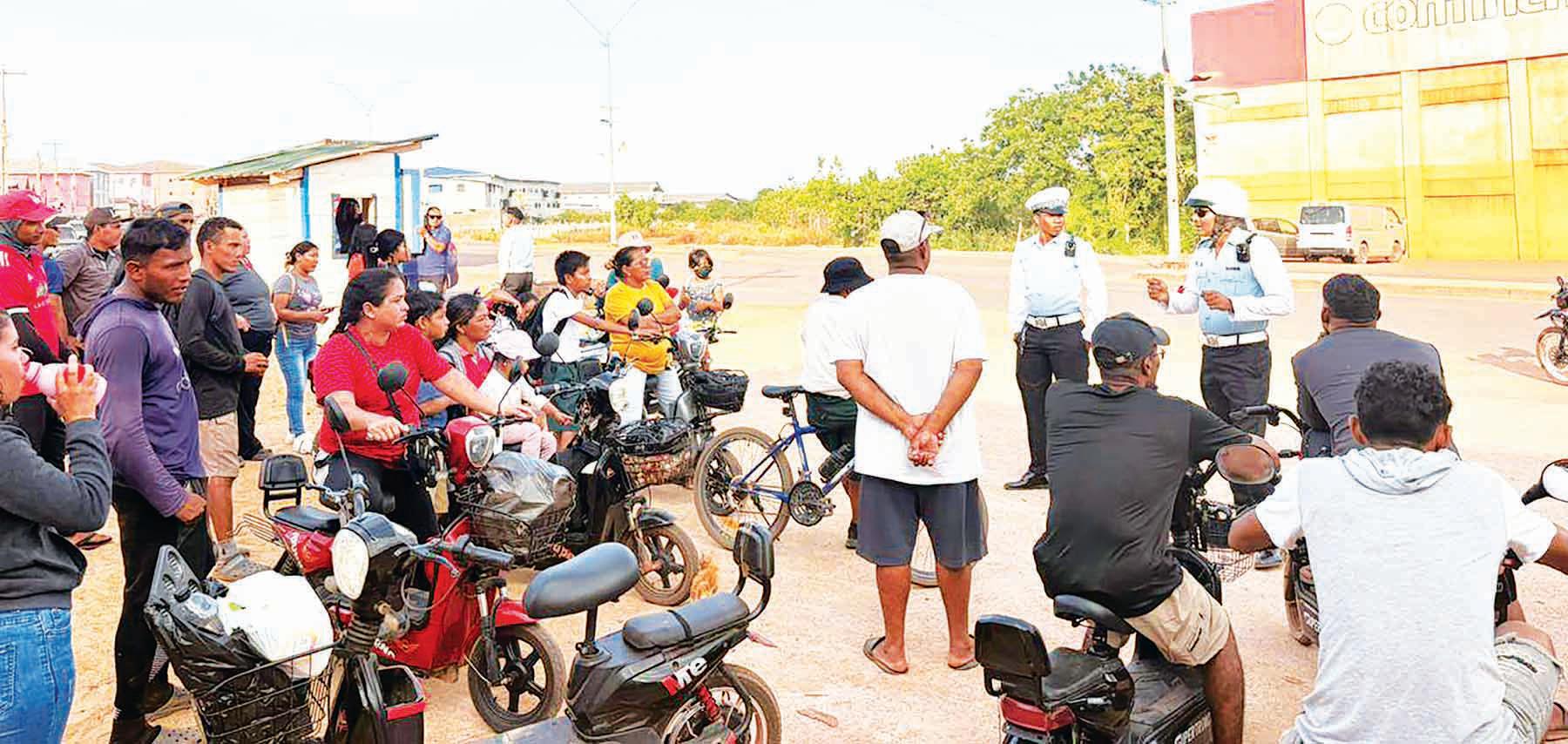
During the exercise, officers addressed several areas, including the process of registering electric cycles, procedures for obtaining
The ranks highlighted the “Five C’s” of driving – Care, Caution, Courtesy, Consideration, and Common sense – as essential prin-
er’s licence is prohibited under the laws of Guyana.
Officers further stressed the importance of defensive driving, advising partici-

a driver’s licence, and the dangers associated with carrying more passengers than permitted. Participants were also reminded of the importance of obeying traffic signs, signals, and road markings.
ciples for all road users. Additionally, riders were reminded that e-cycles must have a white or bright light to the front and a red light to the rear when operated at night, and that operating an e-cycle without a valid driv-
pants to “look out for those who are not looking out for you.” Participants engaged throughout the session, posing several questions that were addressed by the officers in accordance with national traffic laws.
of Herstelling, East Bank Demerara (EBD).
The trio first appeared before Magistrate Abigale Gibbs at the Sparendaam Magistrates’ Courts in July, where they all pleaded not guilty to the charge of possession of cocaine for the purpose of trafficking, contrary to Section 5(1)(a)(i) of the Narcotic Drugs and Psychotropic Substances (Control) Act, Cap. 10:10. The charge alleged that on June 9, at MovieTowne Mall, Turkeyen, the men had 16.784 kg of cocaine in their possession for the purpose of trafficking.
According to reports from CANU, officers acting on intelligence intercepted two motor cars in the vicinity of Turkeyen, where several parcels containing a whitish powdery substance suspected to be cocaine were found. Five people were initially taken into custody following the operation.
During the initial hearing, the prosecution objected to bail for Barakat and Moore, citing the seriousness of the offence and the possibility that the third defendant, Gomez, a Venezuelan national, posed a flight risk. However, Defence Attorney Bernard Da Silva later applied to the High Court under

Section 20 of the Bail Act No. 21 of 2022, arguing that Barakat’s prolonged detention without trial, coupled with the confession of one of his co-defendants, constituted special reasons for bail.
The application, filed on behalf of Barakat’s sister, Falisha Farzana Barakat, stated that Barakat had no previous convictions, was a family man with three minor children, and suffered from chronic medical conditions, including diabetes.
Da Silva contended that Barakat’s continued incarceration amounted to “punishment before trial”, especially since the matter had been adjourned multiple times, with the trial date set for February 10, 2026, seven months after the defendants were first charged. The affidavit in support of
the application highlighted that on September 8, co-accused Collin Moore pleaded guilty in open court and accepted full responsibility for the drugs, stating, “Your Worship, the drugs are mine. I take full responsibility.” Moore was subsequently sentenced to four years’ imprisonment and fined $25,176,000 after the cocaine was valued.
Da Silva argued that the Magistrate failed to give proper weight to the confession and other mitigating factors, which he said should have influenced a decision in favour of bail. In granting bail, Justice Persaud agreed that the circumstances justified judicial intervention. He emphasised that the presumption of innocence remains a cornerstone of the justice system and that bail is not to be used as a tool of pretrial punishment. Justice Persaud also noted that the Bail Act of 2022 empowers the High Court to review and reverse Magistrates’ decisions where necessary in the interest of justice. Barakat was represented by Attorney-at-Law Bernard Da Silva, while Martin Gomez is represented by Attorney Siand Dhurjon. The prosecution is being led by CANU officers.
Addressing questions about potential changes to the fiscal or non-fiscal terms within the agreements, Bharrat clarified that there were no alterations to the fiscal arrangements.
“We are working to have at least two more signings before the year is out. So we have really advanced the negotiation with those two other awardees, and we are hoping that before the ending of 2025, that we can have those agreements signed with those companies.”
“There were no changes to the fiscal arrangements. It's 10 per cent tax, corporate tax as you mentioned, 10 per cent royalties, 65 per cent cost recovery, and a 5050 sharing of property…. There were some expressions of concerns with regards to the non-fiscal terms, some of which we could have worked through, but with regard to the work programme, the fiscal arrangements, the environmental conditions, those were the ones that we were not willing to change or to amend in any way. The fiscal concerns, the fiscal regime – sorry – the work programme in some cases, as well as the environmental standards that were set,” he explained.
When asked about other companies that had been awarded blocks but had not yet completed their agreements, Bharrat said that these were among the entities currently in active negotiations.
However, he noted that progress also depends on the awardees’ ability to secure their signing bonus and demonstrate financial and technical capacity to execute their respective work programmes.
Against this backdrop the Minister confirmed that the Guyanese-owned company Sispro, which had previously faced financial difficulties after being awarded two blocks, remains engaged in negotiations with the Government.
“The team is working feverishly to ensure that we can close off those agreements, but most of the time it also depends on the ability of those awardees from the bedroom to secure, one, their signing bonus, which must be paid upon the signing as mentioned here, and the ability to execute the work programme as well too. So, once we are satisfied that these companies can do that, then we will move ahead with the signing. We know initially
that the Guyanese-owned company that was awarded two blocks, they hadn't come to financial difficulties… They are definitely one of the companies that we are in negotiations with right now, and we are hoping that we can close those negotiations very soon and have at least one of the blocks that was awarded Sispro,” the Minister added.
Meanwhile, Vice President of TotalEnergies, Daniel Larrañaga, expressed his satisfaction with the Production Sharing Agreement (PSA) for shallow-water Block S4 offshore Guyana, highlighting TotalEnergies' 100-year legacy of pioneering that continues to shape its global mission.
“Last year, we celebrated our 100-year anniversary in TotalEnergies and we call it 100 years of pioneering, and we carry that value very dearly in our DNA of the company. Pioneering spirit is one of our values; safety is our core value, which is result-orientated, and respect for each other. So, when you combine all of those values, it aligns directly with what we want to do here in Guyana,” the Vice President of TotalEnergies said.

Representatives from the United Nations Development Programme (UNDP) have travelled to Belém, Brazil, to join international and regional leaders at COP30, advancing efforts on climate action and sustainable development.
During COP30, UNDP is participating in bilateral meetings with heads of state and Government officials from across the region, including President Dr Irfaan Ali. These discussions will explore how UNDP can best support national climate agendas, mobilise resources, and contribute to Guyana’s leadership in climate resilience and sustainable development.
The UNDP on Tuesday said that the event promoted Guyana’s integrated leadership in biodiversi-

ty conservation and climate resilience, showcased the Low Carbon Development Strategy 2030 (LCDS 2030) as a replicable model and advanced the Global Biodiversity Alliance as a multilateral platform for scaling ecosystem restoration and biodiversity finance.
“As we look ahead to COP30, momentum must translate into measurable action. Biodiversity is not a stand-alone goal; it is a key element, with people at its core, at the heart of sustainable development and climate resilience. When nature thrives, people thrive,” UN Assistant Secretary-
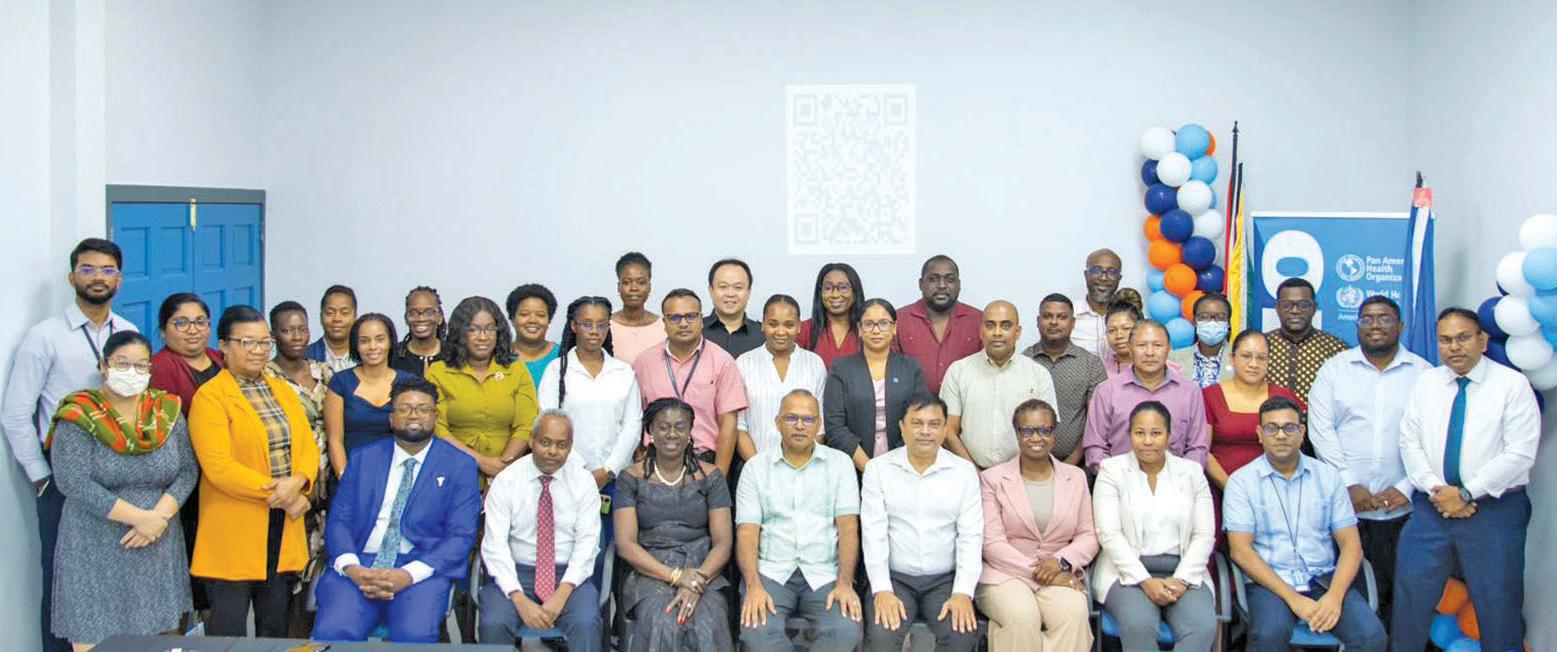
The Health Ministry, in collaboration with the Pan American Health Organisation (PAHO), on Tuesday launched a three-day workshop on Advancing Primary Health Care in Guyana, as part of ongoing efforts to strengthen health care delivery at the community level. The workshop brings together regional and national health leaders to build capacity and develop strategies aimed at improving the effectiveness of Primary Health Care (PHC) across the country.
According to the Ministry, among the main objectives are to reorient health leadership on the new PHC agenda and to develop a regional roadmap for the short- to medium-term implementation of PHC initiatives. Participants are engaging in discussions and training sessions focused on several key areas, including the Integrated Model of Care and Health Service Delivery Network, the evolution and features of a well-perform-
ing PHC system, national PHC monitoring systems, and the PHC delivery model. Director of Family and Primary Health Care Services, Dr Ertenisa Hamilton, highlighted that Guyana has made notable progress in strengthening PHC services over the past five years.
“The fact that we’ve achieved so much is because everyone understood their role and worked collaboratively toward a shared vision,” Dr Hamilton stated. Health Minister, Dr Frank Anthony, reaffirmed the Government’s commitment to continued investment in health infrastructure and service quality. He noted that the Ministry currently manages about 400 health facilities nationwide, including health posts and centres, many of which have undergone significant upgrades. “Over the past two years, we have made substantial financial investments to enhance these facilities – upgrading waiting areas, sanitary facilities, and the overall environment to ensure
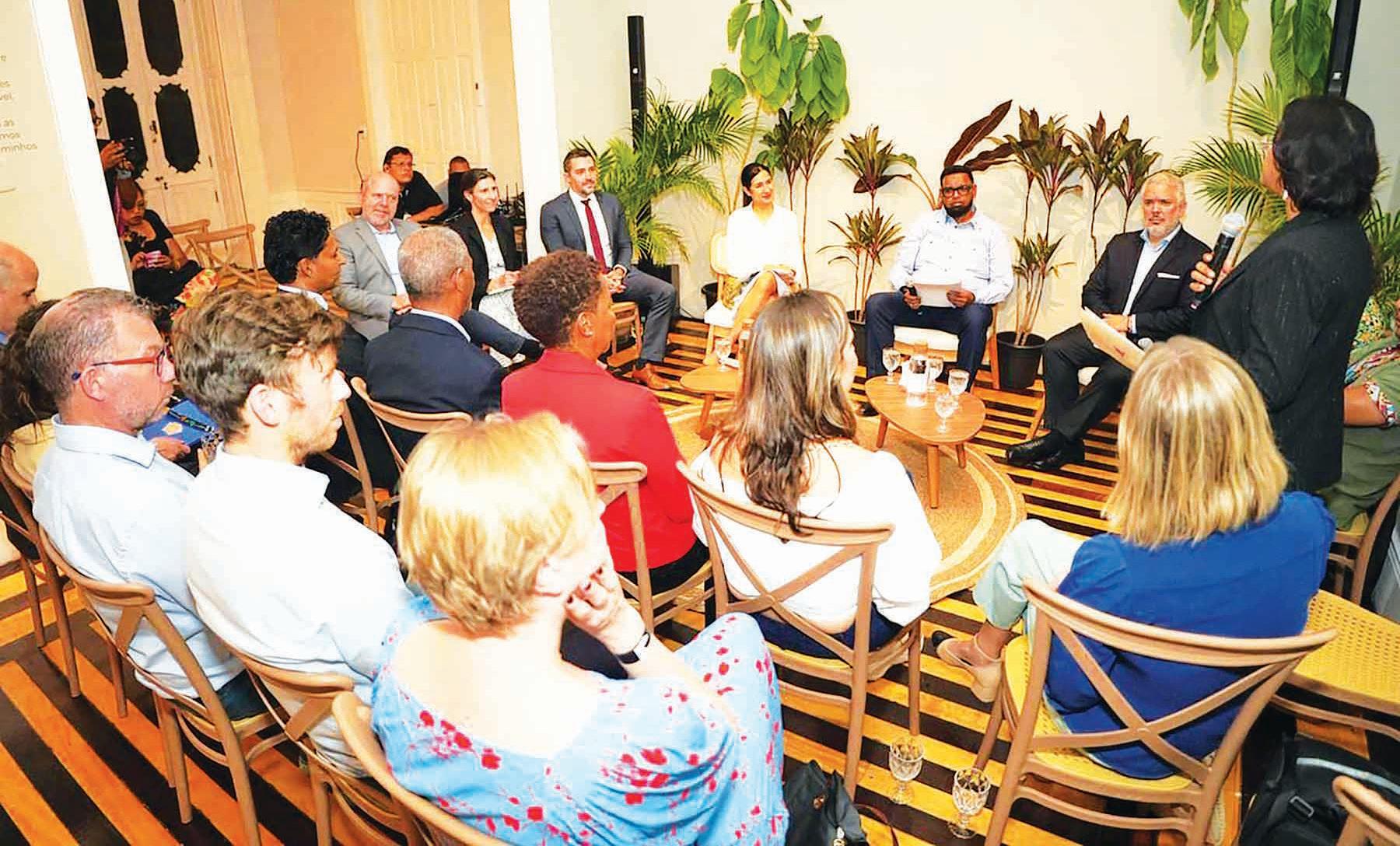
General and UNDP Regional Director for Latin America and the Caribbean, Michelle Muschett, said.
“Protecting and restoring ecosystems strengthens livelihoods, food and water security, and inclusive growth. UNDP stands with partners like Guyana in advancing nature-positive economies, aligning climate, biodiversity, and development as one integrated agenda. The road from Belém to COP30 is our
opportunity to turn ambition into lasting impact for people and the planet,” she added.
Muschett reinforced UNDP’s support of Guyana’s climate and developmental agenda during the COP30 side event, “Guyana’s Pathway to Climate Resilience: Scaling Low Carbon Leadership and Conserving Biodiversity”, on November 7, 2025, in Belém, Brazil, alongside her bilat-
eral meeting with President Dr Ali. UNDP’s engagement at COP30 underscored its commitment to supporting Guyana’s climate ambitions and fostering partnerships for a resilient future, while UNDP’s ongoing work in Guyana demonstrates its commitment to empowering communities, advancing the LCDS 2030, and promoting innovative projects that benefit people and the planet.
GCOPD calls for barrier-free access to financial services for persons with disabilities
that patients receive care in comfort and dignity,” Dr Anthony said.
“At this point, there should be no health facility facing major infrastructural challenges. Our focus now is to ensure improved accessibility, functionality, and quality across the network,” he added.
While acknowledging the progress made, the Minister urged continued efforts to further develop the system and improve service delivery to meet evolving community needs. PAHO/WHO (World Health Organisation) Representative to Guyana, Dr Eva Dickson, underscored the importance of Primary Health Care as the cornerstone of a resilient health system.
“Primary Health Care is the bedrock of community well-being,” Dr Dickson said. “It ensures that essential services – from maternal and child health to immunisation, chronic disease management and mental health support –are available and accessible to all.”

Following President Dr Irfaan Ali’s recent announcement on banking sector reforms, the Guyana Council of Organisations for Persons with Disabilities (GCOPD) commended his efforts to encourage more Guyanese to open bank accounts. GCOPD particularly welcomed the commitment to eliminate discriminatory practices against persons with disabilities in commercial banks, ensuring fair and equitable access to cash transfers and other financial services.
“We are optimistic that these reforms will ensure that commercial banks eliminate all discriminatory practices against persons with disabilities,” GCOPD stated.
The Council highlighted that, for too long, persons who are blind have been told they cannot open personal bank accounts or acquire ATM cards due to their dis-

ability. Many commercial banks have justified these practices by citing internal policies. However, GCOPD noted that there is no empirical evidence supporting such archaic and discriminatory policies, if they exist.
The Council also raised concerns about physical accessibility, noting that many commercial banks and ATM locations remain inaccessible to wheelchair users.
“While these challenges exist in most commercial banks, a few institutions have modelled inclusion and accessibility, facilitating barrier-free access to financial services for persons with disabilities,” GCOPD added.
In line with Guyana’s rapid development, GCOPD has worked to increase the financial literacy of persons with disabilities, including young people, ensuring they understand personal financial management and the range of available financial
services.
With positive transformations in the disability landscape over the past five years, more persons with disabilities have gained employment, making it essential for them to have bank accounts to receive salaries. Additionally, the Ministry of Human Services and Social Security facilitates the transfer of monthly public assistance grants to personal bank accounts, further underscoring the need for inclusive banking practices.
“It is critical that commercial banks address discriminatory practices and implement the necessary measures to ensure that all persons with disabilities can access barrier-free financial services, regardless of their disability type,” GCOPD emphasised.
The Council concluded by expressing support for the banking sector reforms and committing to contribute to the process as it progresses.
The Government says the official death toll in Jamaica from Hurricane Melissa has increased to 45.
Minister of Education, Skills, Youth and Information, Senator Dr Dana Morris Dixon, made the revelation at a press conference on Tuesday morning.
“The numbers have been confirmed by the JCF (Jamaica Constabulary Force); they have investigated, and they have concluded that these deaths were associated with the hurricane, and they have done so with the JDF (Jamaica Defence Force),” Morris Dixon said.
The southwest parish of
St Elizabeth accounts for the most Melissa-related deaths with 18, followed by Westmoreland with 15 fatalities.
She said 33 post-mortems have so far been conducted on victims, “and there are some that they are waiting to conduct the post-mortems on.”
Regarding the deaths, she said, “Those are 45 families that are hurting deeply; as we look at that number, we pray for those families; we pray that God will comfort them.”
Meanwhile, Jamaica has received just over US$1 million from its donation portal via credit cards so far, according to Minister of Information Dr Dana
Morris Dixon.
Speaking during a press briefing on Tuesday, Morris Dixon indicated that through the Support Jamaica portal, the country had received US$1.8 million and J$53.218 million.
In addition, there are now 170 registered donors getting aid into the country with assistance from the Government and 40 bilateral partners who have promised aid to be delivered to Jamaica.
Hurricane Melissa made landfall in the western end of the island on October 28, causing multiple fatalities and widespread damage to the western and southern sections of the country.
(Jamaica Observer)

AUnited States (US) naval strike force centred around the world's largest warship, the USS Gerald R Ford, has arrived in the Caribbean, the US Navy has confirmed.
The arrival of the strike group, which was ordered to the region by President Donald Trump last month, comes amid ongoing strikes against alleged drug boats and tensions with Venezuela.
The US has so far carried out at least 19 strikes against boats in the Caribbean and the eastern Pacific, killing at least 76 persons.
Venezuelan President Nicolás Maduro and other Venezuelan officials have accused the US of "fabricating" a crisis and seeking to topple the country's leftwing socialist Government.
In a statement, the US Navy said that the strike
group entered the area of responsibility of US Southern Command – which oversees Latin America and the Caribbean – on November 11.
The force includes the USS Gerald R Ford aircraft carrier, which itself includes more than 4000 sailors and dozens of aircraft. The strike force also includes guided-missile destroyers and various other vessels.
Pentagon spokesman Sean Parnell said that the force will "bolster US capacity to detect, monitor and disrupt illicit actors and activities that disrupt the safety and prosperity" of the US and will help "disrupt narcotics trafficking" and criminal groups in the region.
Collectively, they form the largest US presence arrayed in and around Latin America in decades.
(Excerpt from BBC News)
Venezuela is deploying weapons, including decades-old Russian-made equipment, and is planning to mount a guerrilla-style resistance or sow chaos in the event of a United States (US) air or ground attack, according to sources with knowledge of the efforts and planning documents seen by Reuters.
The approach is a tacit admission of the South American country's shortage of personnel and equipment.
US President Donald Trump has suggested the possibility of ground operations in Venezuela, say-
ing "the land is going to be next" following multiple strikes on alleged drug-trafficking vessels in the Caribbean and a large US military build-up in the region. He later denied he was considering strikes inside Venezuela.
Venezuelan President Nicolás Maduro, in power since 2013, says Trump is seeking to oust him and that Venezuelan citizens and the military will resist any such attempt.
The US military dwarfs Venezuela's, which is debilitated by a lack of training, low wages and deteriorating equipment, six sources
familiar with Venezuela's military capabilities said.
Some unit commanders have even been forced to negotiate with local food producers to feed their troops because Government supplies fall short, two sources with knowledge of state security forces told Reuters.
That reality has led Maduro's Government to bet on two potential strategies – including a guerrilla-style response referenced publicly, though without details, by high-ranking officials, and another which officials have not acknowledged. (Excerpt from Reuters)

Small island states have described the 1.5°C limit for global heating as “a lifeline” and demanded that the world honour it, amid increasing gloom that the symbolic target has already been breached.
“Small island states are here to demand we honour 1.5,” Toiata Apelu-Uili, mitigation coordinator for the Alliance of Small Island States (Aosis), was quoted as saying by the Reuters news agency.
“It is not a political slogan. This is a lifeline for our survival, for our small islands. We’re here because our survival, our people, and our lives are not negotiable.”
Apelu-Uili, who travelled for two days to get to Belem from Samoa, spoke at a side event on day one of COP30, where representatives of small island states offered delegates a stark reminder of what failure at the climate talks looks like.
The strongest ever storm to hit Jamaica left dozens dead and caused billions of dollars' worth of damage,
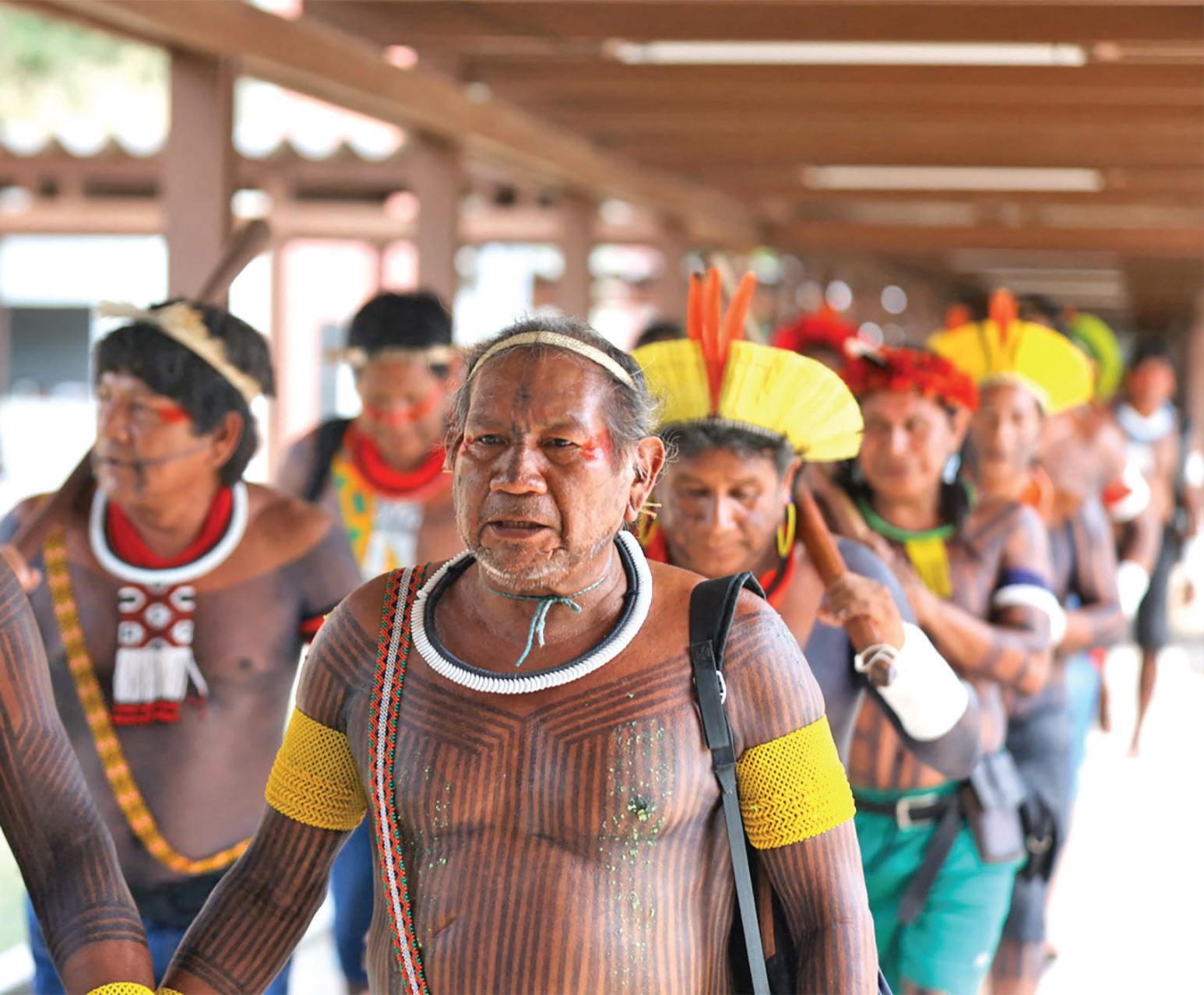
Indigenous people arrive at the Indigenous Camp on the day of the COP30 opening ceremony
roughly equivalent to 28 per cent to 32 per cent of last year’s gross domestic product, according to the island’s prime minister.
“We lost cultural heritage; 300-year-old churches are lost. A part of our identity was lost with it. People are hurting,” Gordon told reporters.
Scientists say that
breaching 1.5°C would lead to several irreversible changes, like melting ice caps driving faster sea level rises of the kind that supercharged the winds driving Hurricane Melissa. Antonio Guterres, the UN secretary-general, last week described its breaching as a “moral failure and deadly negligence”. (Excerpt from the Guardian)
The 18th annual Saint Lucia-Taiwan Partnership Trade Show placed a strong spotlight on food security and digital transformation in today’s landscape. This year’s edition brought together 65 Saint Lucian and 25 Taiwanese businesses at the Pavilion on the Ramp in Rodney Bay from November 7 to 9, 2025.
The three-day event, a key feature of Saint Lucia’s 2025 Business Month, showcased a diverse range of products from agro-processed goods and local cuisine to
handmade crafts, technology and innovative services. The show also encouraged business-to-business (B2B) interactions to deepen trade ties, introduce new products into local value chains and expand domestic opportunities for Saint Lucian manufacturers and service providers.
Held under the theme “Securing Tomorrow: Powered by Sustainability, Built on Resilience”, the trade show celebrated nearly two decades of partnership in trade, enterprise development and innovation between Saint Lucia and
Taiwan.
Nicole Su, Ambassador of the Republic of China (Taiwan) to Saint Lucia, praised the spirit of collaboration, noting that the event exemplified the ambition and creativity of Saint Lucian entrepreneurs.
“The idea is to bring business people, buyers and investors together… so that they can explore together your opportunities,” she said, adding that she is always pleasantly surprised and very much impressed with St Lucian culture. (Excerpt from St Lucia Times)
The United Kingdom (UK) is no longer sharing intelligence with the United States (US) about suspected drug trafficking vessels in the Caribbean because it does not want to be complicit in US military strikes and believes the attacks are illegal, sources familiar with the matter told CNN.
The UK’s decision marks a significant break from its closest ally and intelligence-sharing partner and underscores the growing scepticism over the legality of the US military’s
campaign around Latin America.
For years, the UK, which controls a number of territories in the Caribbean where it bases intelligence assets, has helped the US locate vessels suspected of carrying drugs so that the US Coast Guard could interdict them, the sources said. That meant the ship would be stopped, boarded, its crew detained, and drugs seized.
Shortly after the US began launching lethal strikes against the boats in September, however, the UK grew concerned that the
US might use intelligence provided by the British to select targets. British officials believe the US military strikes, which have killed 76 persons, violate international law, the sources said. The intelligence pause began over a month ago, they said.
The British embassy in Washington and the White House did not respond to requests for comment.
A Pentagon official told CNN that the department “doesn’t talk about intelligence matters.” (Excerpt from Trinidad Guardian)



Oil prices gained about US$1 on Tuesday on the impact of the latest United States (US) sanctions on Russian oil and the optimism over a potential end to the US Government shutdown, although oversupply concerns limited gains.
Brent crude futures settled US$1.10, or 1.72 per cent, higher at US$65.16 a barrel. US West Texas Intermediate crude climbed 91 cents, or 1.51 per cent, to settle at US$61.04 a barrel.
Investors continued to assess the fallout from the US sanctions on Russia and their impact on both crude oil and refined fuel markets.
Russia's Lukoil declared force majeure at an Iraqi oilfield it operates, sources told Reuters on Monday, marking the biggest fallout yet from the sanctions imposed last month.
Restricted fuel exports due to the sanctions are propping up oil prices in the face of a crude oil glut, PVM analyst Tamas Varga said.
"Fresh US sanctions on major Russian oil producers and exporters are weighing on product exports," Varga said. As a result, heating oil and gasoline are moving in a different direction from crude.
Middle Eastern producers Saudi Arabia, Iraq and Kuwait will raise crude oil supplies to India in December as Indian refiners seek alternatives to Russian barrels, sources at four Indian refiners said on Tuesday.
The markets also saw support as the longest Government shutdown in US history could end this week after the Senate approved a compromise that would restore federal funding.
(Excerpt from Reuters)
Asuicide bomber killed 12 persons in Pakistan's capital on Tuesday in a sharp escalation of militant violence that the Defence Minister said had pushed the country into a "state of war".
Pakistani Government Ministers accused neighbouring Afghanistan of complicity in the bloodshed – an accusation Kabul denied – and vowed retaliation if Afghan authorities failed to rein in the militants Islamabad says were responsible.
"We are in a state of war," said Defence Minister Khawaja Muhammad Asif after the attack, the first strike on civilians in Islamabad in a decade. "Bringing this war to Islamabad is a message from Kabul, to which Pakistan has the full power to respond."
Israel's Parliament has passed the first reading of a bill proposing the death penalty for those it deems to be terrorists acting against the state – a requirement which means it is likely to be used only against Palestinians convicted of deadly attacks on Israelis.
The bill – which has been condemned by the Palestinian Authority and human rights groups –was backed in the 120-seat Knesset by 39 votes to 16.
Far-right National Security Minister Itamar Ben-Gvir – whose Jewish Power party brought the vote – celebrated late on Monday by handing out sweets.
"After the law is finally
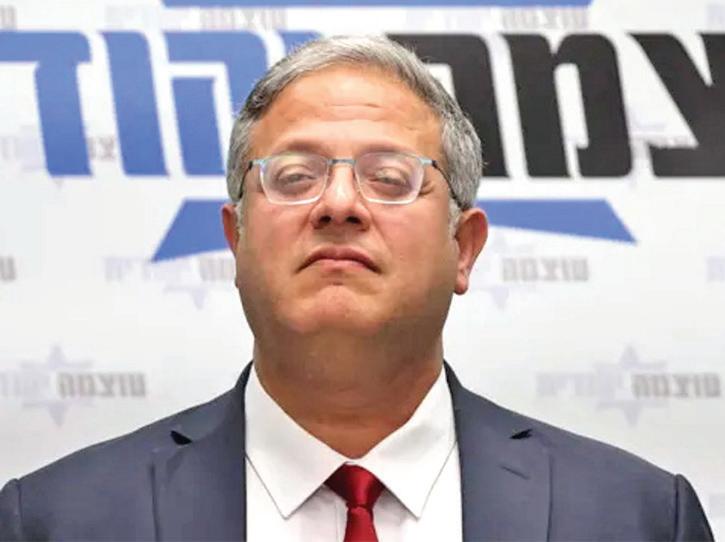
Far-right National Security Minister
passed – terrorists will only be released to hell," he said.
The bill must pass two more readings before becom-
ing law. In the same session, the Knesset also approved the first reading of another con-
troversial bill allowing the Israeli Government to close a foreign media outlet without court approval. That vote was 50 in favour and 41 against.
The legislation aims to turn a temporary order that allowed the closure of Qatari-owned Al Jazeera in May 2024 into a permanent law. It has been opposed by the Government's legal advisers.
While the death penalty does exist for a small number of crimes in Israel, it has only been used twice since 1948, when the state was created. The last time was when the Nazi war criminal, Adolf Eichmann, was hanged in 1962, after a public trial. (Excerpt from BBC News)
that could
Turkish prosecutors have charged Istanbul’s jailed mayor, Ekrem İmamoğlu, with 142 offences that could carry a penalty of hundreds of years in prison, in a move seen as a politically motivated attack on the country’s opposition.
The indictment filed on Tuesday, which runs to nearly 4000 pages, charges the popular opposition figure who was arrested on March 19 with offences including running a criminal organisation, bribery, embezzlement, money laundering, extortion and tender rigging.
The state news agency,
Anadolu, said prosecutors would be asking for prison sentences that could amount to up to 2430 years behind bars if he is found guilty.
Turkey’s opposition leader said the charges were intended to prevent İmamoğlu from running for President in the 2028 election.
“This case is not legal; it is entirely political. Its purpose is to stop the Republican People’s Party (CHP), which came first in the last local elections, and to block its Presidential candidate,” Özgür Özel said on X.
The arrest of İmamoğlu, the main political rival of
Turkey’s President, Recep Tayyip Erdoğan, was met with outrage from the CHP and prompted demonstrations across Turkey. It was the country’s worst street unrest since 2013.
İmamoğlu faces allegations that include espionage and faking his university degree, which could lead to him being banned from running for President. (Excerpt from The Guardian)
Turkish military plane with at least 20 on board crashes in Georgia

Subsequent skirmishes on the Pakistan-Afghan border were followed by unsuccessful peace talks.
The main Pakistani jihadist group, Tehreek-eTaliban Pakistan, otherwise known as the Pakistani Taliban, denied involvement in the attacks.
Pakistani Taliban militants have in recent years focused attacks on security forces. Civilians had not been hit in Islamabad for a decade, according to Armed Conflict Location and Event Data, a group that tracks attacks.
Analysts said that it seemed to be an attempt to replicate a 2014 attack on another army-run school in the northwest, in which more than 130 children were killed. (Excerpt from Reuters)
Pakistan is locked in confrontation with Kabul and New Delhi, fighting a four-day war with India in May and then last month carrying out airstrikes in Afghanistan, including Kabul, in response to what it said was the presence of Pakistani militants there.
Armed men in Mali killed a TikTok influencer who had posted videos in support of the West African nation's military, authorities said Monday.
"The young TikTok user Mariame Cissé was abducted by armed men on Friday while she was at the weekly market in Echel ... The following day, at dusk, the same men brought her back to Independence Square in Tonka and executed her in front of a crowd," Yehia Tandina, the mayor of Timbuktu, told The Associated Press.
The mayor of Tonka in the Timbuktu region, Mamadou Konipo, confirmed the killing but said he didn't have more information.
Tonka is a village along the Niger River, roughly 93 miles from Timbuktu. Members of the al-Qaeda affiliate Jama'at Nusrat
ul-Islam wa al-Muslimin, or JNIM, are known to operate there. JNIM, which was formed in Mali in 2017, has become one of Africa's deadliest jihadist groups within the space of just a few years, according to BBC News.
Cissé, who was not a member of the military, sometimes posted images of herself in military fatigues to her more than 150,000 followers, which is thought to have drawn attention from the armed men.
Cissé received death threats several days before she was abducted, according to the Timbuktu mayor.
Armed groups, primarily JNIM, operate in large swathes of rural regions.
The landlocked nation is currently under a fuel blockade by JNIM.
No group has taken responsibility for the killing. (Excerpt from CBS News)
ATurkish military plane with at least 20 persons on board has crashed in Georgia close to the border with Azerbaijan, Türkiye’s Defence Ministry has said.
There were no immediate reports on the number of casualties or the cause of the accident involving a C-130 cargo plane, which had taken off from the Azerbaijani city of Ganja on Tuesday.
However, both Türkiye and Azerbaijan, which are close allies, have indicated that there have been fatalities.
Türkiye’s Defence Ministry said 20 Turkish personnel, including flight crew, were on the C-130 plane but did not mention possible passengers of other nationalities.
Local media said that
Azerbaijani personnel were also travelling on the United States (US)-made aircraft, which was heading back to Türkiye when it crashed. Dramatic footage published by Azerbaijani media appeared to show the aircraft sending a large cloud of black smoke into the sky after it hit the ground.
Türkiye’s Interior Minister Ali Yerlikaya said his Georgian counterpart, Gela Geladze, arrived at the scene at around 17:00h local time (14:00 GMT). Search and rescue operations were ongoing, he added.
The plane went down in the Sighnaghi area of the Kakheti region, about 5 kilometres from the GeorgianAzerbaijani border, the Georgian interior Minister confirmed. (Excerpt from Al Jazeera)

















Put your energy where it counts. How hard you work will depend on your ability to be direct and live up to your promises. Choose bold words, stick to the truth and adopt a smile and a friendly demeanor.
















Stick to simple terms and map out a route that ticks off everything on your to-do list. Set goals that are reasonable and unlikely to be jeopardized by outside influences.
Changes you make due to emotional influences will slow you down. Look for alternative ways to reach your destination without raising eyebrows or igniting a negative response from onlookers.
Participate in social events, engage in work-related activities and network to expand your interests. Diversify, and use your imagination to apply what you can offer in new and exciting ways.
Use words, not actions, and you'll make progress. Reach out to the source instead of complaining to the go-betweens. Change only what's necessary, and distance yourself from people heading in a different direction.
Put a plan in place before making a move or trying to change the impossible. Detail and precision will play a role in what you achieve and how others perceive you.
Be careful whom you share your ideas with. Someone is likely to take advantage of you if you aren't careful. Opportunity is within reach if you advocate on your own behalf.
Critique yourself before criticizing others. Making progress will help you maintain a positive state of mind. Observe what your cohorts are doing, and it will help you decide what's next for you.
Speak up, and you'll find out where you stand and what's possible. Refuse to jeopardize what you have for something intangible. Set guidelines and get what you want in writing.


Add a splash of ingenuity to whatever you do, and you'll gain interest and a platform to share your plans. A change is within reach, so start mapping out the possibilities.




Learn from experience that too much of anything will lead to trouble. Slow down, take inventory and see what's left. Your strength, knowledge and skills will lead to bigger and better opportunities.
Set a budget and a timeline, and get moving. Trust in your abilities and discipline to help you see matters through to the end. When opportunity knocks, be quick to respond and to show your worth.






Pakistan withstood a valiant all-round display from Wanindu Hasaranga to claim a six-run victory in the first One-Day International (ODI) against Sri Lanka in Rawalpindi. The win gave them a 1-0 lead in the three-match series.
Chasing 300 to win, a target that would have constituted the second-highest successful chase in Rawalpindi, Sri Lanka were set up well, courtesy of an 80-run opening stand, but then lost wickets in clusters through the middle overs to fall behind the required rate. A few stands through the middle overs still provided Sri Lanka the control they might have been looking for, but none of their batters were able to capitalise on their starts.
Hasaranga, batting with the tail, scored 59 off 52 balls to take the chase into the final overs. However, with 21 needed off 10 balls, he was eventually dismissed. Even then, two boundaries from Maheesh Theekshana in the final over gave Sri Lanka hope of an unlikely heist, but Hussain Talat held his nerve with the ball.
This, though, was a hard-fought win set up by Salman Agha's second ODI century, which helped Pakistan recover from a sluggish start to pose a competitive target. It was then brought home by what was eventually a stellar display from Pakistan's bowlers, but not one without some significant blemishes – the innings saw 26 wides and two dropped catches.

Igniting the game was a fiery spell from Haris Rauf, who ended with figures of 4 for 61. Rauf's intervention came at a point when Sri Lanka were coasting along with Pathum Nissanka and Kamil Mishara, on ODI debut, in the midst of an 85run opening stand off just 70 deliveries.
During that period, Sri Lanka were rollicking along –though much of that early brisk scoring was of Pakistan's own doing. Of the 26 wides across the Sri Lankan innings, roughly 70 per cent came inside the opening power play. That provided Sri Lanka's chase the impetus it needed, shortly after which both Nissanka and Mishara also began to find their range.
At that point it was hard to look past a comfortable Sri Lankan chase, but all that changed when Mishara spliced an attempted flat-batted slap straight to mid-off, off Rauf. This triggered the first of two mini-collapses in the innings, as Kusal Mendis chopped on the very next delivery before Nissanka edged behind in Rauf's next over. From 85 for 0, Sri Lanka had stumbled to 90 for 3.
But even at that point, with Sri Lanka playing seven specialist batters, the chase seemed well in hand. A view reinforced by the 57-run stand between Charith Asalanka and Sadeera Samarawickrama that followed.
Coming off 80 deliveries, it wasn't a particularly rapid stand, but it helped Sri Lanka regain some of the control that had been lost by the sudden burst of wickets. It was also a partnership which had minimal risk-taking, and as such, it took a moment of utter brilliance to bring it to an end.
After Sadeera had edged one through a vacant slip region and swung and missed at another, Shaheen Shah Afridi swiftly installed Babar Azam at slip. And Babar was imme-
diately in action as he sprang to his right and plucked an edge off Sadeera the very next delivery. It was a moment of outrageous skill that brought those in attendance at an increasingly raucous Rawalpindi stadium to their feet.
That, though, was the appetiser for what was to follow. The arrival of Janith Liyanage instilled some urgency into Sri Lanka's proceedings, as he and Asalanka put on a stand of 36 off 31 balls. While Asalanka, who earlier in the day seemed to have incurred what looked to be a hamstring niggle, was struggling for fluency, Liyanage was rotating the strike with ease.
During this period it seemed like Sri Lanka had at last found the blueprint for victory: rotate strike, take the game deep, don't panic. Unfortunately for Sri Lanka, that final memo seemed to have passed them by. Asalanka's brain fade was the catalyst for the next mini collapse, as he charged out to Mohammad Nawaz, only to be left all at sea as Mohammad Rizwan whipped off the bails. Liyanage fell shortly after, as Naseem Shah redeemed himself for his earlier profligacy by seaming one back in to knock back the off stump. Kamindu Mendis then ended up chopping on an attempted pull after one had kept low from the excellent Faheem Ashraf.
Just like that, Sri Lanka were 210 for 7, with Hasaranga the only recognised batter at the crease. Hasaranga's last ODI fifty had come back in November 2022, but here he batted with clear purpose. Intent on taking the game deep, he was unafraid to give strike to Dushmantha Chameera and then Maheesh Theekshana, as he mixed in the odd boundary to keep the required
but the ball prior to that highlighted the confidence with which he was batting – sweeping an attempted Chameera yorker for four.
Prior to Agha and Talat's stand, however, Sri Lanka had choked the Pakistan innings for large parts. Miserly opening spells from Asitha Fernando and Chameera ensured just 28 runs were scored inside the opening power play, and while just one wicket fell during that period, the introduction of Hasaranga saw wickets fall at a canter. He ended up with figures of 3 for 54, with Asitha and Theekshana the only other wicket-takers for Sri Lanka.
Hasaranga might have had another to close out the over after he had Talat rapped on the knee-roll only for the umpire to turn down the appeal. Ball-tracking showed it would have crashed into the leg stump, but Sri Lanka had burnt both their reviews early on – both for lbw appeals where the ball pitched outside leg.
That proved to be a sliding doors moment of sorts as Pakistan's fortunes gradually began to shift, and it was also some much-needed luck for Talat, in particular, whose place in the side had come under increasing scrutiny of late – his six innings in ODIs leading up to this game had seen him manage 107 runs with a high score of 41.
But with Pakistan in need of resuscitation, he and Agha set about rebuilding. The plan was clear at this point: keep wickets intact for the final overs and then launch. And in this instance, the execution was perfect. Sri Lanka, who might have regretted their decision to not go with a genuine fifth bowling option, were left requiring Liyanage to bowl eight overs of his part-time seam after Charith Asalanka was taken for 18 in his two solitary overs.
Liyanage, to his credit, gave away 48 runs, though with Sri Lanka in the ascendancy at the halfway point of the innings, their need to get through their fifth bowler quota allowed Talat and Agha to settle in nicely.
And while Talat was unable to see the innings to its close, Agha ensured he remained unbeaten to get his side to a competitive total – one that proved just about enough in the end.
(ESPNcricinfo)

rate from going beyond a relatively manageable 10 an over.
But with boundaries the need of the hour, heading into the penultimate over, Hasaranga could only muscle a just-below-waisthigh full toss to Babar at long-on – a catch not as spectacular as his first, but arguably more important. From then on, Pakistan could breathe a little easier, while Sri Lanka were left to ponder what might have been.
After Pakistan were asked to bat first, they lost early wickets, but a century from Agha and a maiden ODI fifty from Talat helped revive their flagging innings to 299 for 5. The pair came together at 95 for 4 in the 24th over, but by the time their 138-run partnership came to an end, they had taken Pakistan to 233 for 5 in the 44th over.
Agha then turned on the afterburners alongside Nawaz, as Pakistan managed 104 runs off the last 10 overs to set Sri Lanka 300. Agha brought up his second ODI tonne with a gentle dab behind point for a single off his 83rd delivery,

The Guyana Police Force (GPF) Officers Cricket Team on Tuesday, November 11, proudly presented a set of cricket gear to 15-year-old up-and-coming cricketer Keon Byass, in recognition of his potential and passion for the sport.
The presentation was made by the captain of the Officers Cricket Team, Deputy Commissioner (Administration) Ravindradat Budhram, in his office at Eve Leary, alongside Superintendent Ronald Alli, Vice Captain of the team.
In a social media post, the Guyana Police Force highlighted that Byass, a student of Valmiki College and an enthusiastic fast bowler, is the son of Woman Superintendent Fredella Boyce. The post further noted that his journey reflects "the positive influence of discipline,

dedication, and family support in youth development".
Having started his cricket career at the Police
ing
During
In the East Coast Cricket Board (ECCB) Premier Insurance Second -Division 40-over competition at the Fairfield Ground, Golden Grove B took on Young Rivals B in a reduced 25over contest.
added 71 runs in quick time, thrilling the fans with excellent stroke play and towering sixes.
sporting talent within the Force and across Guyanese communities.
When asked by Guyana Times Sport about receiving support from the GPF Officers Cricket Team, Byass expressed his gratitude, saying:
"It feels like there are people who see my talent and support what I can achieve and what I'm doing in my cricket career."
Sharing his aspirations for the future, the promising fast bowler added:
"Some of my dreams are to make the Guyana Under-17 team and make it into the West Indies setup or play for my country in the CPL [Caribbean Premier League]."
The GPF Officers Cricket Team continues to serve as a platform for nurturing young talent, helping to build discipline, character, and national pride through sport.

then bowling Raj Mangal for a duck. Suddenly, Young Rivals were 71 for 2.
Winning the toss, Golden Grove B opted to bowl first, but the home side got off to a flying start. The Young Rivals’ openers
Leg-spinner Akeem Persaud turned the momentum with a crucial double strike – first dismissing Tyrell Peters for a blistering 47 off 22 balls (including seven sixes), and

The collapse continued when off-spinner Steven Mangal entered the attack. He ripped through the middle order, claiming four wickets among the next five to fall, reducing the hosts to 106 for 7.
However, Matthew Shivtahal and Vijay Kalpu produced a match-defining partnership. Their brilliant 108-run stand revived the innings, with Shivtahal scoring 50 from 39 balls and Kalpu 52 from 38 balls. Thanks to their efforts, Young Rivals posted a strong 214 for 8 in 25 overs.
For Golden Grove B, Mangal was exceptional with figures of 4 for 20 from five overs, while Persaud supported well with 2 for 38.
In reply, Golden Grove’s top order struggled, stumbling to 15 for 3 inside seven overs. Mangal (36 from 48 balls, two fours) and Cordel Mars attempted to rebuild with a 70-run stand, but the required rate continued to climb.
Mars, however, played a lone hand, remaining unbeaten on a powerful 77 from 55 balls (five fours, five sixes). Gerald Montfort supported him with 12 not out as Golden Grove closed on 151 for 5, falling 63 runs short.
Young Rivals B emerged deserved victors, led by disciplined bowling and a commanding lower-order recovery that sealed their dominance on the day.
The Berbice Cricket Board (BCB) has clarified that no decision has yet been made regarding the outcome of the two-day semi-final clash between Young Warriors Cricket Club and Rose Hall Town Youth and Sports Club (RHTYSC), which ended in a draw with no first innings result.
In a statement, the BCB’s Competitions Committee emphasised that discussions were ongoing and a final decision would only be made after a meeting with both clubs, which was expected to be held shortly.
The match, played at the Young Warriors Ground, was a high-scoring affair that saw three hours of play lost to rain, affecting the possibility of an outright result.
At the close of play on the final day, Young Warriors were 360 for 9, valiantly holding on in pursuit of RHTYSC’s 403 for 8 declared.
For Rose Hall Town, Kevin Sinclair produced a superb innings of 175, supported by Junior Sinclair (51), Javed Karim (44), and Kevlon Anderson (40). Bowling for Young Warriors, Shimron Hetmyer
and Trevon Stanislaus each claimed two wickets.
In reply, Young Warriors mounted a spirited effort, led by Seon Hetmyer’s century (106) and Suresh Dhanai’s unbeaten 61. RHTYSC’s
bowling spoils were shared among Matthew Pottaya, Junior Sinclair, and Keith Simpson, who each took two wickets.

With both teams displaying strong performances and no first-innings advantage established, the BCB will now determine the way forward for the competition once consultations with the clubs are completed. (G-4)



The New Zealand versus West Indies five-match T20 International (T20I) series sits at 2-1 with New Zealand leading. After the rained-out fourth T20I, Shai Hope and his West Indies side will be aiming to level the series when the final match bowls off today, Wednesday, November 12. New Zealand, who are enjoying home

conditions and are crunching games in critical moments, will be hoping to finish the series with a win and a score-line of 3-1.
Hope commended the fight shown during the series, with all three of the four completed matches coming down to the wire.
“We didn't really get a chance to get out there and maximise in this game, but we've still got a chance to level the series and that's our main focus for the next one. I was looking forward to this one, especially coming from Bangladesh. You'd expect a little bit better surface here in New Zealand.”
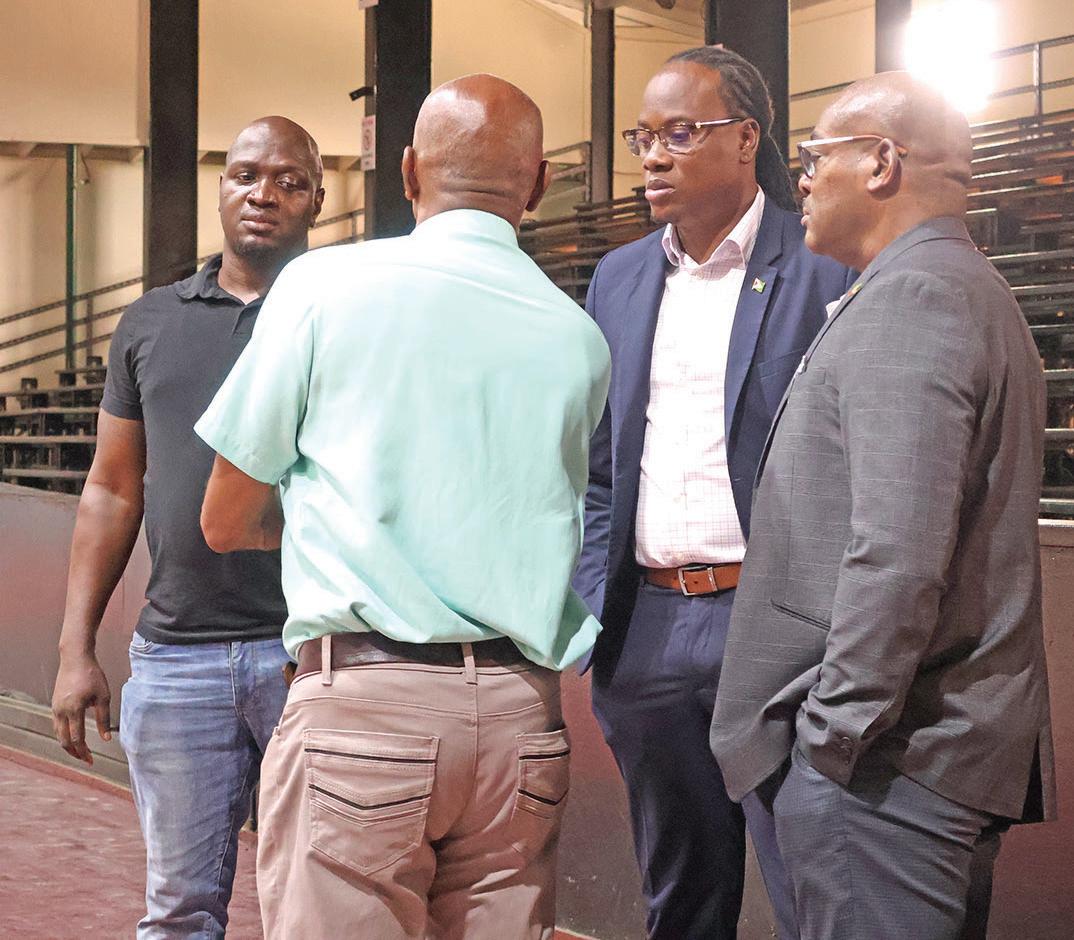
Mere hours away from Guyana’s hosting of the FIBA Women’s Caribbean Championship, final touches were, on Tuesday afternoon, being executed at the Cliff Anderson Sports Hall (CASH).
Minister within the Sport Ministry Steven Jacobs, while divulging the work that has been done at the venue, assured that it would be ready for the competition’s commencement tomorrow.
The Minister divulged, “Obviously, this is the Cliff Anderson Sports Hall; we had a lot of games being played here, volleyball and so forth. This is a major tournament, the FIBA Women’s Championship, so we obviously had to take out those lines, fix the floor because it’s being broadcast live. It’s a huge tournament, just want to make
sure the facility is ready. We did a few improvements on the lighting and basically, regular servicing.
“The facility is ready; final touches taking place now, so we’ll be ready for tomorrow evening,” Jacobs guaranteed.
The Minister went on to speak on the magnitude of the event, noting that it was a crucial part of the Ministry’s plan.
“Listen, this is major. Every opportunity that we get to host a tournament, may be regional or international, we welcome this. Just recently you saw that we’ll be hosting the CASA [Caribbean Area Squash Association tournament] in a few weeks’ time, so it’s important. We want to position Guyana as a sporting destination, and we want to promote sports tourism, and by doing this, we’re going to diversify the economy, building
out our facilities, improving our human capital in persons who’re sports managers, coaches, trainers. We relish the opportunity to host these tournaments, and we support these associations whenever these opportunities present themselves,” the Sport Minister explained.
The cricketer-turnedpolitician continued, “Just recently Charles Ramson Jr spoke of hosting 29 tournaments in 2024; the number is even bigger this year, and then next year again, it’ll be even bigger. We just want to ensure that we give opportunities also to our locals to display their talent on the regional and international stage.”
Having met the women’s team earlier on Tuesday, Minister Jacobs reiterated some advice as he encouraged fans to support the team’s campaign.
“I met them earlier today, and I told them it’s very obvious that I want them to win – but it’s just important that they enjoy playing with each other and enjoy the moment. And once you do that, you place a lot of emphasis on playing hard and making sure you’re consistent; the rest will take care of itself,” he said.
“I want persons to come and support their team here. Come out and look at some beautiful women’s basketball,” the Minister urged.
Guyana will play host to The Bahamas, the Virgin Islands, Suriname, and Jamaica from November 12 to November 16, as those teams vie for three available spots in the CentroBasket 2026 tournament.


Hope added: “It's just about us trying to progress as a team. It's great to see the fight that we've been showing. Unfortunately, we didn't win those last two games. But every time you put yourself in this position, you've obviously got a chance to win. So I'm very happy with the progress that we're making.”
Alick Athanaze, batting four times, has 101 runs, while the consistent Romario Shepherd has 92 runs. Jacob Duffy and Ish Sodhi are the leading bowlers with six wickets each.
Meanwhile, New Zealand Captain Mitchell Santner is expecting another good surface in Dunedin, New Zealand. He is also
expecting another good match between the sides.
“With the overcast conditions, it's quite nice. The ball was swinging a bit. I guess the pitch being under cover a little bit as well. The more you put yourself in these positions, the more you're going to learn from it. Obviously, nice to be on the right side of a couple. There's learnings in both games for both teams. We go to Dunedin, like you said, it's probably going to be a bit colder. But, probably another good surface and probably another good match, to be fair,” Santner said.
The first ball of the fifth and final T20I is expected to be bowled off at 20:15h local time.

Chelsea Edghill has earned a spot in the Women’s singles round of 16 after a mixed bag of results on Tuesday for the Guyanese table tennis team at the 2025 Islamic Games in Saudi Arabia.
Elishaba Johnson began proceedings on Tuesday morning with a 4-0 win over Mauritania’s El Hacen Ahmed Salem in the men’s singles round of 64. Johnson won 114, 11-3, 11-1, and 11-3.
Then, Edghill went the distance in a seven-set
encounter with Aishath Rafa Nazim of the Maldives for a win in the women’s singles round of 32. The set unfolded in the Guyanese Olympian’s favour 13-11, 6-11, 6-11, 113, 10-12, 11-9, 11-9.
However, Jasmine Billingy’s fortunes were different, as she lost to Turkey’s Ece Harac 11-2, 11-4, 11-3, and 11-7.
Unfortunately, Shemar Britton also lost, falling to Saudi Arabia’s Alu Alkhadrawi 11-6, 11-6, 11-5, 11-6 in the men’s singles round of 32.
Johnson, who had earlier in the day advanced to that round, met a similar fate when he faced Amir Hossein Hodaei of Iran. Hodaei prevailed 112, 11-5, 11-7, 11-4.
However, Edghill managed to lift the spirits of the Guyanese team in Saudi Arabia with another nailbiting win, this time against Uganda’s Judith Parvin Nangonzi. The seven-game match ended in Edghill’s favour 8-11, 9-11, 11-9, 119, 14-12, 9-11, and 11-8, to advance to the quarter-finals.
The table tennis action at the Boulevard SEF Arena in Riyadh City will continue today with the Guyanese pairs springing into action. Edghill and Britton will team up to take on the Bangladesh pair in the mixed doubles round of 16, while Britton will later join forces with Nigel Bryan for a matchup with Uganda in the men’s doubles round of 16. In the women’s doubles round of 16, Edghill and Billingy are scheduled to take on an Iranian duo.
There will also be singles’ action on the cards as Edghill prepares to take on Sibel Altinkaya of Turkey in the women’s singles quarterfinals.


“Bigger and better” is the order of the day for the third instalment of the President’s National Futsal Tournament, as not only increased prize monies but also an additional category will highlight the competition, set to kick off at the Cliff Anderson Sports Hall (CASH) in less than a month’s time.
Not only will this year’s men’s tournament see an increase in the grand prize from $2 million to $3 million, but the youths will also get a bite of the pie in the newly-introduced Schoolboys’ championships.
Co-Director of the organising body, Kashif and Shanghai Organisation, Kashif Muhammad, during Tuesday morning’s launch, shared the rationale on why they continue to push the futsal agenda and now, among the schoolboys.
“Futsal is extremely important to the development of football in Guyana, and that’s the reason why we’re embracing it and trying to make it something really, really spectacular.”
Muhammad continued, “A couple of years now, our team would get together, and we were talking about school futsal, because we want to get the real nursery for the senior futsal. Other than that, there’s the InterGuiana Games that plays, there’s a futsal aspect of it and we always lose to Suriname. This is simply, because we don’t have a real solid futsal school team, so what we decided to do is get the schools involved and try to make this a real serious developmental programme
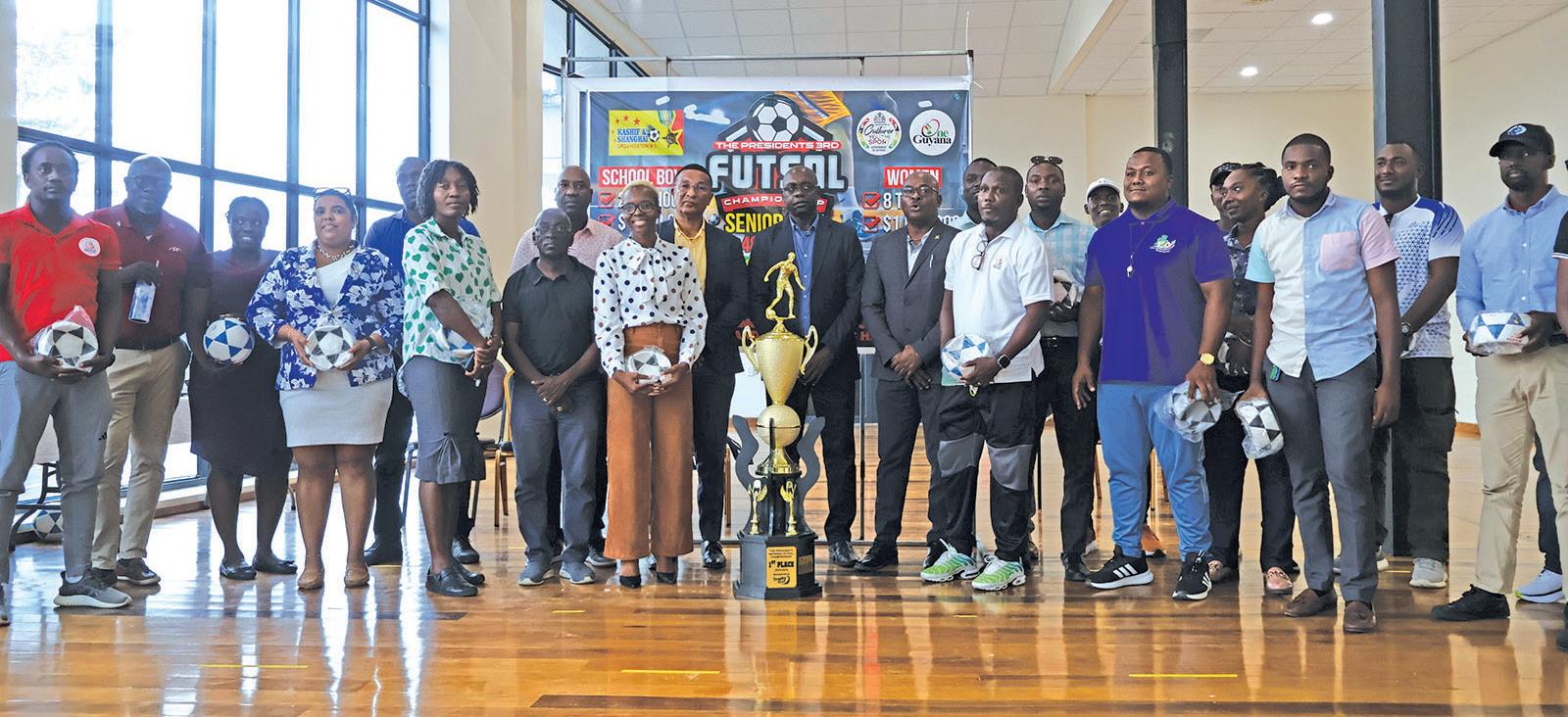
for the school futsal.”
“We didn’t want it to be a straight knockout tournament, because we just didn’t want these youngsters to come and play one game and they get knocked out and that’s it. So, we did the 20 [teams] in five groups, and then we’re going to do a round robin, so all the schools will get an opportunity to play four games. Because we think, four games, the children are going to have fun, they’re going to enjoy themselves,” the organiser further enlightened.
Forty-eight teams will compete in the men’s competition, inclusive of teams from Brazil and Trinidad and Tobago, and eight in the women’s competition, while the schoolboys’
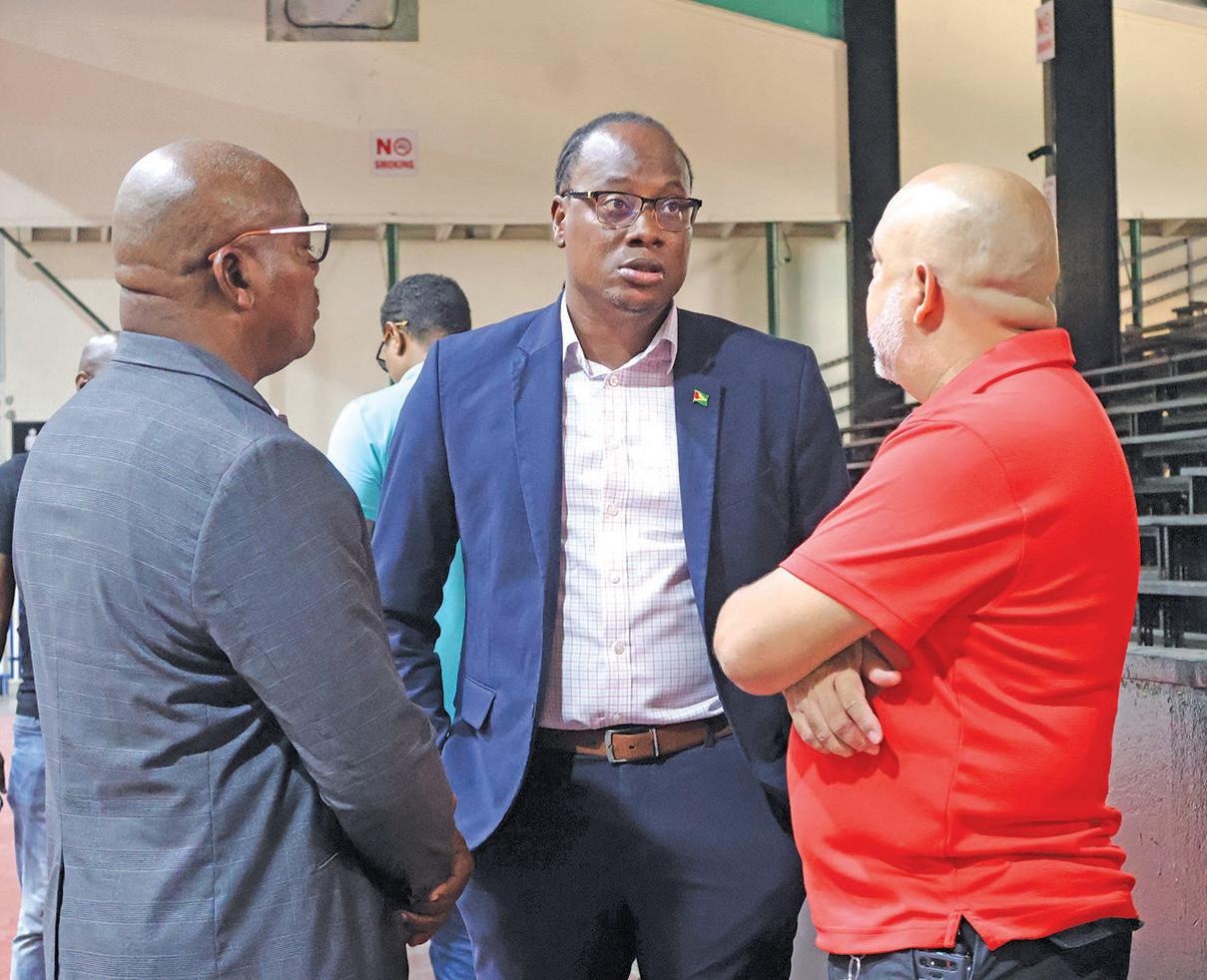
tournament will attract some 20 teams from around the country.
Director of the schoolboys’ competition, Naylon Loncke emphasised that discipline will play a major role in the schools’ segment.
Loncke warned, “We’re big on discipline. We’ve noticed many times there’re tournaments where various accusations of indiscipline happen, and we’re firm in our stance that we’re not accepting any form. All students must adhere to the rules and the conditions of the tournament. Then, we’re also placing that on the teachers and the head teacher.”
talking about basically is cheating, where you would involve some student or some individual that don’t attend the school or isn’t of the age to be playing in this tournament. The tournament is under 18; you can be 18 during the tournament,” the coach/teacher went on to add.
The schools slated to compete are South Ruimveldt Secondary, Charlestown Secondary, West Ruimveldt Secondary, East Ruimveldt Secondary, North Ruimveldt Multilateral, New Central High, Carmel Secondary, Dolphin Secondary, St John’s College, Cummings Lodge Secondary, St Stanislaus College, St Joseph’s High, The Bishops’ High, Hope Secondary, Westminster Secondary, West Demerara Secondary, Vreed-en-Hoop Secondary, VYC Academy and Annandale Secondary.
The males will compete for a $3M grand prize, while the second-, third- and fourthplace finishers will pocket $1 million, $500,000 and $250,000, respectively.
In the women’s competition, the winners will cart off $500,000, while second, third and fourth will receive $250,000, $150,000 and $100,000.
The schoolboys’ prizes will be in kind, ranging from $700,000 for first place to $350,000 for second, $250,000 for third and $200,000 for fourth place.
The national futsal competition is set to run from Tuesday, December 9 to Friday, January
